Anwesh Satpathy's Blog
August 15, 2025
Differentiated citizenship and the civic community

Over the last couple of decades, the idea of universalist citizenship increasingly became the subject of criticism owing to its inadequacies in dealing effectively with the complexities of a plural society. Scholars like Iris Marion Young, while acknowledging its emancipatory potential, argued that the strict equality envisioned in universalist citizenship often leads to perpetuation of oppression. Differentiated citizenship, in contrast, acknowledges the importance of diversity and allows for differential treatment and special rights for groups as a way of realizing equality. In this article, I provide a brief overview of the debate between differentiated citizenship and universalist citizenship while arguing that differentiated citizenship helps in enhancing the prospects of a civic community of equals.
According to T.H. Marshall, citizenship “is a status bestowed on those who are full members of a community”. Citizenship, in the Marshallian model, has three elements: — civil, political and social. These elements directly correspond to the institutional structure of society. Civil rights i.e. the right to own property, freedom of speech and right to justice are provided by the judiciary. The right to participate politically as a representative or as a voter corresponds to the institution of parliament while economic and social welfare are provided by education system and the welfare state. Tracing the trajectory of these elements historically, Marshall argues that they are often interdependent. Civil rights, for instance, initially did not include the creation of new rights as much as it included the expansion of old rights to new groups. This is evident through the expansion of the franchise which is reflective of the overlap between the different elements. Marshall moved beyond the merely legal aspect of citizenship by emphasizing on these rights. This made him one of the earliest to implicitly distinguish between formal and substantive citizenship.
Marshall’s focus was specifically on Britain and his essay was written in the aftermath of World War II. The conflicts of citizenship that concern us now are thus not addressed by Marshall: — particularly concerning multi-ethnic societies and accommodation of difference on account of racial and gender inequality. Marshall’s conceptualization of three distinct elements does help in providing an undifferentiated framework under which women can be charted. An attempt can be made to move away from elaborating only on the political extension of rights to the related question of the right to own property, justice etc. However, as Ursula Vogel points out, these rights are premised upon the assumption that all individuals are placed at an equal distance to law. Marshall’s evolutionary model only functions when it excludes women from the realization of the universal. In his discussion of civil rights, Marshall notes the gradual expansion of rights to all adult members of the community while adding a caveat concerning the “peculiar” status of women in the same period. It was only in 1988 that the British government sought to abolish the taxation system that treated married women as chattel of their husbands. Marshall’s conceptualization of the past in terms of a gradual, evolutionist model towards the realization of the rights from the elites to the masses as a whole provides the framework for further expansion of rights in relation to different classes. The recognition of gender as a crucial element serves as an obstacle to this narrative.
Universalist citizenship demands that citizens, at least in the public realm, give up their claims to particular group identities and interests in order to foster a general will. The political theorist Benjamin Barber is representative of this view. Barber, while making a case for participatory democracy, draws a clear distinction between the public aspect of citizenship and the private affiliation to other forms of identity. The existence of one’s membership to the community of citizenship depends on their ability to form a single vision for future. It becomes necessary for individuals to give up their needs and desires to realize the universal. Such commonness is only possible when citizens are assumed to be homogenous and willing to collectively rise beyond their particularities. This assumption can also be found in Rawls’ “ideal theory”. An attempt to reconstruct a perfectly just society appears reasonable at the first glance. Nevertheless, critical race theorists like Charles Mills have pointed out that such a society can only exist without prior experience of injustice[1].
Given the limitations of the universalist conception of citizenship, how should one accommodate pluralities of identities and interests? Amy Guttman has shown how participatory democracy in community control of schools had often led to increased segregation as the privileged whites were able to present their case better[2]. An explicit recognition of oppression via group differentiated citizenship can help us navigate such complexities better.
A common objection to differentiated citizenship is the presumption that it will lead to essentializing and concretizing difference instead of alleviating existing oppression. It has been argued, for instance, that the British empire in India helped in concretizing caste by socially classifying groups for administrative purposes like the census[3]. This does not mean that caste did not exist or that it was any less oppressive and hierarchical before the arrival of British. A census would be unnecessary and meaningless without prior social and historical identification of a group. A social group exists not because of essential characteristics but because of social status ascribed to members of the group, self-identification and common historical experience[4]. Young (1989) posits that we occupy a group-differentiated society wherein some groups are privileged while others are oppressed through exploitation, marginalization, prejudice and violence[5]. Differentiated citizenship is justified on the basis of a group’s oppression, not it’s essential characteristics. In Young’s conception of group-differentiated citizenship, institutional mechanisms ought to be set up to encourage self-organization of the oppressed group members, helping generate and voice concerns regarding policy proposals where decision makers would be obliged to take their considerations into account and the availability of veto power in policies specifically affecting the group such as reproductive rights and autonomy for indigenous peoples[6]. Enhancing the voices of the oppressed group will also help in ensuring the privileged group understand experiences and perspectives different from their own.
There are gaps in Young’s analysis that need to be probed. It is not self-evident that veto power would necessarily lead to the realization of equal respect. This can be illustrated through the instance of the Shah Bano case in case. In 1985, the Indian Supreme Court granted the divorcee Shah Bano the right to maintenance from her husband through the criminal law[7]. This led to strong reactions within sections of the Muslim community and eventually culminated in the government enacting a law that shifted the onus of maintenance to relatives. This case is reflective of the conflict between gender rights and community rights. It is a difficult question to navigate through precisely because a cultural community’s rights to practise its own traditions must not be impeded upon, except under extraordinary circumstances where the rights of others are affected. Jayal (1997)[8] proposes that while community rights must be protected and encouraged in a plural society, it must not be allowed to impede the non-negotiable democratic core.
A related problem for Young’s conception is the precise basis on which groups ought to be represented. Young specifically lists women, Puerto Ricans, LGBT members, working class, the poor, the old, disabled people, Native Americans, Chicanos, Asian Americans etc. as being part of oppressed groups. Critiquing this potential of endless fragmentation, Kymlicka poses a question about the exact manner in which such groups ought to be represented adequately[9]. Kymlicka does not see universalist citizenship to be contradictory with differentiated citizenship. Differentiated rights can be pursued through special representation rights i.e. self-government or reservation/affirmative action for certain minorities and polyethnic rights i.e. the right of religious or ethnic minorities to follow certain practices like wearing the turbans for Sikhs or the yarmulka for Jews. Kymlicka, however, restricts such representation to only national and ethnic minorities. Thus, while this framework is specific, it fails to acknowledge or redress adequately the way in which institutional and societal oppression is experienced by sexual and gender minorities. A more inclusive approach would be to set up an institutional mechanism which facilitates conversation with decision makers and permits the granting of special rights to oppressed communities while ensuring the democratic core is not impeded upon.
A major objection to group-differentiated rights is its potential to threaten the civic community of equals. This is essential to address as citizenship and the rights associated with it are accompanied in contemporary society almost exclusively in relation to the nation-state. The breakdown of a national community is accompanied inevitably in the loss of substantial rights. This can be analysed with reference to India.
In the aftermath of partition on the basis of religion, calls for the reorganization of states on the basis of language grew. Prime Minister Jawaharlal Nehru, who had previously supported the linguistic basis of states in principle, considered it disruptive post-independence[10]. Deputy Prime Minister Patel too voiced concerns over the movements for linguistic states and considered it to be an obstacle in the growth of nationalism[11]. Yet, the government was unable to resist the demands and eventually caved in. Contrary to suspicions that recognition of states on linguistic basis would harm social cohesion, it helped in fostering stability. India’s constitution granted special rights/reservations to it’s historically discriminated and socially ostracized lower caste groups. The discomfort to accommodate special rights can be seen again through the category of “backward classes”. Prominent sociologists like G.S. Ghurye denied the existence of this category and saw it as a detriment to building a casteless society[12]. The fears expressed by the government concerned the question of social cohesion again. The eventual extension of reservations to “Other Backward Classes” was followed by massive political mobilization. This has been referred to as the “silent revolution”[13]. The accommodation of these differences did not lead to any call for secession. In fact, it led to greater representation of these classes in the political and social space.
The dichotomy between universalist and differentiated citizenship falls down when one notices the case of Hindu nationalism. Jayal (2013)[14] argues that Hindu nationalism is a form of exclusionary universalism. V.D. Savarkar, one of the originators of Hindu nationalism, argued for the Indian state to treat its citizens equally. This existed comfortably with his majoritarianism wherein all the decisions were to be made by the Hindu community. For the Hindu nationalists, majoritarianism can be achieved by utilizing the democratic framework as long as the seeds of their ideology are properly dispersed in society. In Savarkar’s conceptualization, the Indian nation was formed after Prince Ramachandra violently invaded Ceylon and bought the Hindus under one imperial reign[15]. Savarkar celebrates Hindu colonization outside the geographical boundaries of India. It is in this vein that he praises Vikramaditya for recolonizing the Indus[16]. The exclusionary-universalism of Hindu nationalism, which at first glance appears to be merely majoritarian, provides ideological justification of imperialism. M.S. Golwalkar, the second chief of the Hindu nationalist paramilitary organization Rashtriya Swayamsevak Sangh (RSS), dispensed with Savarkar’s nominal support of equal rights and argued that minorities do not even deserve citizens’ rights[17]. The tendency to portray Hindus as the universal does not merely manifest in relation to religious minorities. It is also reflected in the Hindu nationalist’s refusal to support special rights for lower castes. In recent times, this can be seen through dilution of special rights rather than an explicit disavowal. Jaffrelot (2019) has argued that the rise of Hindu nationalism can be partly explained as a counter revolution of the social elites against the silent revolution of the lower castes[18].
The distinction between group-differentiated citizenship and universal citizenship manifests primarily through their approach to dealing with plurality. Contrary to the claims of its proponents, universal citizenship can often be exclusionary and lead to the endangering of the sentiment of belonging for minorities. Group-differentiated citizenship, on the other hand, has helped in enhancing the feeling of belonging and strengthening civic community through the granting of special and celebration of plurality. While there are practical unresolved issues concerning the particular groups to be granted special rights and recognition, this approach as a whole has been much more successful in accommodating difference than universalist citizenship.
Notes
[1] Mills, C. W. (2017). Black Rights/white Wrongs: The Critique of Racial Liberalism. United Kingdom: Oxford University Press.
[2] Gutmann, A. (1980). Liberal equality. United Kingdom: Cambridge University Press.
[3] Dirks, N. B. (2001). Castes of Mind: Colonialism and the Making of Modern India. United Kingdom: Princeton University Press.
[4] Young (1989), p. 260
[5] Ibid, p. 261
[6] Ibid, p. 261–262
[7] https://main.sci.gov.in/jonew/judis/9303.pdf
[8] Jayal, N. G. (1997). Secularism, identities and representative democracy. Comparative Studies of South Asia Africa and the Middle East, 17(2), 11–20. https://doi.org/10.1215/1089201x-17-2-11
[9] Kymlicka, W. (1996). Multicultural Citizenship: A Liberal Theory of Minority Rights. United Kingdom: Clarendon Press.
[10] Guha, R. (2008). India After Gandhi: The History of the World’s Largest Democracy. India: Macmillan.
[11] Guha (2008), p. 183
[12] Jayal, N. G. (2013). Citizenship and Its Discontents: An Indian History. Germany: Harvard University Press.
[13] Jaffrelot, C. (2003). India’s Silent Revolution: The Rise of the Lower Castes in North India. India: Permanent Black.
[14] Jayal (2013), p. 217
[15] Chaturvedi, V. (2022). Hindutva and Violence: V. D. Savarkar and the Politics of History. United States: State University of New York Press.
[16] Chaturvedi (2022), p. 172
[17] Jayal (2013), p. 217
[18] Jaffrelot, C. (2019). Modi’s India: Hindu Nationalism and the Rise of Ethnic Democracy. United Kingdom: Princeton University Press.
[image error]March 6, 2025
Putin and the domestic drivers of Russian foreign policy

An understanding of Russian foreign policy, particularly in the reign of President Vladmir Putin, will remain incomplete without taking into consideration domestic factors. While international factors do play a role, their role has often been overemphasized. This does not merely lead to an incomplete theoretical framework but also significantly affects actual policy.
A general overview of the debate surrounding the role of institutional domestic factors in foreign policy is necessary to understand the theoretical framework in which my argument is situated. Ronald Rogowski posited that domestic institutions significantly affect foreign policy strategies. As the economist Douglass North has argued, states with relatively deficient institutions such as the Ottoman Empire and the Soviet Union survived for as long as they did because economic competition in international sphere is much less fierce compared to the domestic sphere. Rogowski posits three independent variables to evaluate the influence of domestic strategy empirically, namely: — franchise, representation and decision rules. Franchise refers to the exertion and extent of formal influence that a particular group, say, adults, aristocrats or property owners have over the region. Assigning too much weight on a particular group, say, warrior aristocracy may lead to an increase in expansionist policies while suffrage may incline society towards pacifism. Representation refers to the format in which those who make up the franchise are selected. Large constituencies may point to an increasing likelihood of an accommodative approach while small constituencies, especially when homogenous, may lead to favouritism. Decision rules refer to the process by which selected representative(s) steer decisions. In The Federalist Papers, some of America’s founding father argued for a stronger presidency as it will result in a cohesive foreign policy while fragmented power will fail to provide the adequate “bulwark of national security”.
While discussing the influence of domestic factors over Russian foreign policy, one often comes across oversimplification as well as generalization in the literature. This is particularly noticeable in popular western media, which benefits from giving Russia an aura of mysticism. The influence of Aleksandr Dugin, a far-right philosopher with mystic hues, on Putin’s domestic and foreign policy, is often grossly overstated. While ideology does have an impact, it is merely one of the many factors to be considered. Nevertheless, this is understandable given that Kremlin’s policymaking apparatus is secret. References are constantly made to national identity to justify decisions while in reality the decisions are only made to benefit certain groups. President Putin remains the primary decisionmaker. Under President Boris Yeltsin, it was possible for the then-Minister of Foreign Affairs Yevgeny Primakov to formulate the “Primakov doctrine”. Putin’s foreign policies, in contrast, is almost always singularly attributed to him. Russia’s accession to WTO, which remained dormant for the longest time, happened only after Putin’s approval. This is not to say that no other individual plays a role in decision-making. Foreign Minister Sergei Lavrov, who enjoys Putin’s confidence considerably, was instrumental on developing policy in Syria. President Medvedev similarly played a crucial role in developing US-Russia Partnership during the Obama years and engaged with the European Union to launch the “partnership for modernization” programme. While external factors such as the Arab Spring, the failure of the American policy did play a role in his decline, it was eventually domestic factors of competing interests and Putin’s unwillingness to cede the centre of power that eventually cemented it. The influence of other individuals on policy extends only so far as they enjoy Putin’s confidence.
A major reason for the failure of the Americans and the European Union’s attempt to engage with Russia lies in their lack of consideration for ideational motives which are inculcated domestically. The EU, being a postmodern entity, sought to include Russia in its larger project of political and human rights. Russia, on the other hand, is a modern entity which saw its partnership with EU on pure economic, transactional terms. President Obama took a similar approach with the reset. The reset managed to achieve many of its short-term objectives. Russia and the US collaborated on the Afghanistan front. Russia banned the sale of S-300 missiles to Iran. Russia’s accession to the WTO also happened in the aftermath of this period. The reset had no impact in transforming Russia’s civil society, transparency or encouraging liberal democracy. As Lo argues, Russia and the US had different reasons for entering into the agreement. Russia felt secure to re-establish its relationship as US was reeling from the global financial meltdown of 2008 and felt threatened by the rise of China. The reset, from Russia’s perspective, marked a recognition of its status as a global power. Obama, on the other hand sought a strategic partnership with the perception of Russia as a helpful regional ally but not a global leader. As Timothy Snyder has argued, Russia’s ambition to be considered a global hegemon has strong historical basis. While Snyder’s work has been subject to some criticism for his conflation of ultra-nationalism with fascism, his limited point on the influence of ethnonationalists deserves to be explored further.
Rogowski has claimed that regimes that are considered to be legitimate are better able to project themselves as global power. In the case of a liberal democracy, legitimacy is established through free and fair election as well as the presence of strong representatives. How does one explain legitimacy in the case of Russia, which is often criticized for its crackdown on civil and political rights? The “Russian Spring” or “Novorossiya” movement can potentially help us identify some answers.
Post the Russian annexation of Crimea, there was mobilization of volunteers and activists on ground in support for President Putin. Such support has usually been association with a phenomenon known as “astroturfing” wherein sponsors operate under façade of grassroots organizing. This has occurred after the invasion of Ukraine on social media as well. Greene and Robertson challenge this conventional narrative. The Kremlin utilized the ideas of ultra-nationalism and imperialist Eurasianism to carve out a distinct idea of the Russian federation incorporating Russian-speaking people across the territories of former USSR states. It was in this context that demonstrations took place in support of the military actions in Crimea incorporating students, veterans, members of political parties etc. This was amplified by state-propaganda television channels. Russia was portrayed as saving civilians and resisting western forces while “returning” Crimea to its place. Supporters of Eurasianism cannot simply be dismissed as agents of the Kremlin. Dugin, one of the most prominent proponents of this ideology, has since expressed his disillusionment with Putin. The movement, nevertheless, did lead to a boast in Putin’s popularity. Putin utilized the proponent of these ideologies to boast his legitimacy and justify his military actions. The invasion of Ukraine was similarly preceded by an essay by Putin questioning the sovereignty of Ukraine and arguing for a common identity of Russians and Ukrainian. This essay essentially espoused the same ideology as that of the Eurasians. Thus, it is hard to ignore the role that domestic ideology envisioning Russia as a hegemon plays in foreign policy considerations.
While Putin can be justifiably blamed for weaponizing a pre-existing ideology, it is also the case that his regime played a crucial role in cementing a consensus. This was constructed utilizing the Kremlin’s hold over media. Putin’s rise to power was followed by the elimination of news channels that did not sing to his tune. As a consequence, the only viewpoint that the majority of Russians had access to was that of Putin’s. As Chomsky has noted, mass media is a potent tool for conveying the perspectives of the elite consensus to the general public in order to subtly manufacture consent. The existence of state-sponsored media plays a crucial role in reinforcing the radicalization of the supporters of the regime. Owing to “motivated reasoning”, people tend to follow media that aligns with their pre-existing worldview. However, the political circumstances and state monopoly in Russia make it hard to access oppositional media. The recent “Sovereign internet” law allows internet surveillance and seeks to create an internet separate from the world.
In conclusion, Russian foreign policy cannot be separated from domestic drivers. While Russia’s institutions can be insular and secretive about the nature of their decision-making, it’s central-apparatus and the role of Putin is well established. The relative stability of the regime in the face of military conflict can be partly attributed to Putin’s ability to create a veneer of legitimacy through the use of media and dormant social consensus to general mass support for his actions. Thus, it is crucial for western powers to be cognizant of Russia’s aspirations and goals while establishing future partnerships.
[image error]June 24, 2024
Of alignment problem and AI ethics
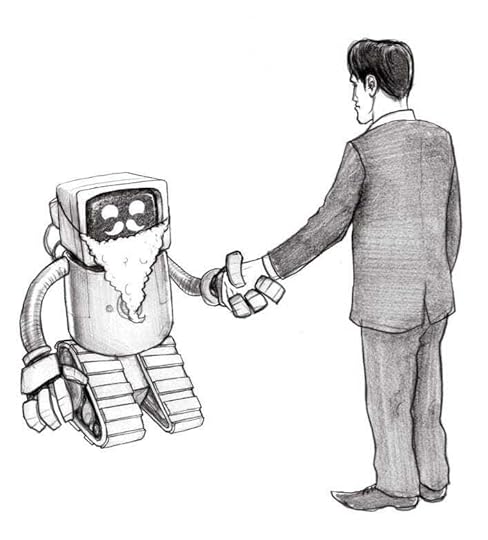
The advent of large language models (LLMs) in recent years like Chat GPT and Gemini has led to increased discussion among the public as well as the academia on the possibilities and dangers that AI holds in transforming normal everyday life as we know it. The immediate response by many universities was to revert to pen and paper to avoid the use of AI in assignments. Notwithstanding the impermanency of such a “solution”, this event highlights the fact that there is a general recognition among people of the transformative, perhaps even destructive, potentials of LLMs specifically and Artificial intelligence generally. All remaining doubts on the transformative potentials were dispelled when the notoriously apathetic entertainment industry i.e. Hollywood came to streets against perceived misuse of generative AI . Conversations regarding the potential existential risks of AI as well as the difficulty of aligning AI with human values have gained a new lease. In this article, I trace the trajectory of these ideas through the works of various thinkers, including the philosopher Nick Bostrom and the computer scientist Eliezer Yudkowsky, and argue that the existing concerns of existential risks of A.I is valid but severely limited by the framework of “longtermism”.
Before tracing the roots of the debates concerning existential risks, it is helpful to look at the specifics of the arguments concerning the AI alignment problem. To illustrate the need for AI ethics, Bostrom and Yudkowsky present a scenario of a bank using machine learning algorithm to decide mortgage application approval. It is found later that the approval rate for blacks have been steadily dropping. One would assume that A.I. would be more transparent and thus prejudicial in its approval. Yet, the fact remains that Blacks are denied mortgages due to poor credit history. While a human being may sometimes consider the differing socio-economic circumstances among races while approving applications, a machine would simply look at the statistics of credit history. An algorithm intended to replace human judgements must necessarily inherit certain social requirements. For instance, the legal system functions through predictability exemplified by precedence. It is based on precedence that judge reasons for judgements and lawyers justify their case. For A.I. to function in the legal environment, it must acquire some form of predictability. Similarly, Bostrom highlight transparency, responsibility, auditability and incorruptibility as criteria to be considered while creating algorithm to replace human judgements.
The eventual goal of A.I. companies like Open-AI is to create Artificial General Intelligence. While the A.I. that we have today has already achieved superiority in multiple fields compared to human beings, it is still domain specific. Deep Blue, for instance, can defeat our best players in chess but it cannot drive a car. AGI will not be predictable for human beings. Deep Blue was not programmed to perform a specific chess move. The possible chess moves are extremely difficult to quantify. Moreover, had the programmers provided the machine with possible good moves then the machine would not have been able to make stronger chess moves than its creators. The programmers sacrificed the predictability of local, proximate outcomes for the sake of the larger ultimate outcome of winning. Creating an A.I. which would act in an ethical manner conducive to human well-being would mean an A.I. that would think in the same manner as human beings about ethics under varying circumstances. It is important here to mention that human values are not a monolith. Cultures across the world not only disagree on ethics but often have oppositional ideas on the same topics. An argument can still be made that a moral A.I. is possible. A pacifist, for instance, sincerely believes in non-violence. Should the pacifist be given an option of acquiring the ability to murder people without hesitation through the consumption of a pill, the pacifist would still refuse owing to his present sincere belief in non-violence.
Omohundro argues that a sufficiently advanced AI will exhibit certain basic “drives” which can be designed to ensure a positive future for humanity . Such a system, Omohundro argues, will be rational as they are goal directed. AGI will not be confined to one goal i.e. playing chess. We may want an A.I. that will be able to play both chess and checkers. Thus, the system must find a pathway to properly master both the games equally. To navigate through conflicting goals, they will have to be assigned real-valued weights or “utility function”. The uncertain outcome can be evaluated by finding out its expected utility. For the system to maximize expected utilities, they will have to be rational economic agents. Rational agents, however, are not necessarily moral agents. These basic AI drives do not mean AGI will be moral. It merely provides us with expected space which we can use to attempt the induction of ethics. The fact that AGI, by its very definition, will have to operate in at least some unpredictable manner makes it more difficult to sustain morality. This is particularly concerning given that Omohundro’s basic drives includes “self-improvement”, which cannot be controlled by human beings. It is possible that under situations of emergency, AI will not hesitate to sacrifice the lives of few to save the many being a rational, utilitarian agent.
There is no good reason to suspect that ASI will have the same morality or even a “better” form of morality than human beings. Consider the scenario where we encounter an extremely bright individual with visible extraordinary intelligence. The said individual, in this scenario, spends the whole day counting blades of grass or recounting pi to a million digits. To most of us, this would strike as bizarre. This is because we have some form of shared idea over what counts as interesting or “boring” or valuable. We have evolved in a selective environment. An advanced non-human being in a different environment may indulge in tasks that we consider to be “boring”. As Bostrom writes: — “Intelligence and final goals are orthogonal axes along which possible agents can freely vary. In other words, more or less any level of intelligence could in principle be combined with more or less any final goal.” Much of the research concerning AI ethics is similarly fraught with anthropomorphising.
AI also has thought-speed advantage. This means that AI thinks millions of times faster than us. Should we desire to pull off the plug of a dangerous AI, it will still have ample of time to figure a way out as it would be extremely unlikely to outsmart such a system. As Eliezer Yudkowsky writes :- “the AI runs on a different timescale than you do; by the time your neurons finish thinking the words ‘I should do something’ you have already lost.”
It is extremely difficult to identify all possible constraints and values required to build ASI for it to have an amicable attitude towards human beings, instead of being hostile. Moreover, these problems will have to be solved before creating the first AGI or ASI. The fact that we are yet to solve these problems and are instead engaging in a competition to create AGI is troubling. All these circumstances give credence to the argument of AI being an existential risk. Yet, it is also important to inquire into the specific ethics or philosophies motivating those who are concerned about AI ethics.
Bostrom’s interest in existential risks precedes his identification of AI as an existential threat. According to Bostrom, “a non-existential disaster causing the breakdown of global civilization is, from the perspective of humanity as a whole, a potentially recoverable setback: a giant massacre for man, a small misstep for mankind.” These long-term potential existential disasters are much more pressing than the problems that are occurring today. Bostrom argues that even if there is a potential 1% chance of creating the technological, transhumanist utopia that he envisions, then the “he expected value of reducing existential risk by a mere one billionth of one billionth of one percentage point is worth 100 billion times as much as a billion human lives.”
The long termism advocated by the likes of Bostrom does not mind sacrificing the autonomy of individuals today for the sake of potential individuals a hundred years from now. We live in a “semi-anarchic” vulnerable world where states do not have the capacity to implement proper surveillance to prevent potential attacks leading to “devastation of civilization”. As a solution to this, Bostrom recommends pre-emptive policing and state’s ability to monitor its citizens closely through a “high tech panopticon”. This proposal does sound like an archetypal dystopia. For Bostrom, however, it is only a matter of time before we achieve advanced technological development where nothing sort of global surveillance can stop the end of humanity. Bostrom’s concerns about existential risks are explicitly framed under utilitarianism. As he writes: — “For standard utilitarians, priority number one, two, three, and four should consequently be to reduce existential risk, where the fifth should be to colonize space as soon as we possibly can.”
Let us assume, for the sake of the argument, that the top tech companies of the world heed the requests of the likes of Yudkowsky and Bostrom to have a moratorium on AI development owing to reasonable existential risks and the alignment problem. What sort of ethics would be prioritized in this alternative scenario? Among the thinkers who have seriously argued for AI as an existential risk, Bostrom is preeminent. His voice is heard and taken seriously by tech billionaires like Elon Musk and Sam Altman. It is fair to assume then that the sort of ethics that AI would be made to align with under this scenario would reflect the utilitarian long termism of Bostrom. Should we be surprised if the so-called “ethical” AI then helps build a global surveillance system that Bostrom envisions? The problem with discussion around AI ethics is that it is only discussed on the terms that appeals to the select few in Silicon Valley. Therefore, AI will only align, if it ever does, with the values of the capitalist long-termism of the Silicon Valley, which is not even representative of the values of most Americans, much less the world. While AI’s risk to the future of humanity cannot be ignored, we must expand our discourse to other parts of the world. This will enrich our conversations on AI ethics by expanding our imagination to ways of being that are not centred around billionaires. It is only through an honest conversation of this manner that we can even hope to create an AI that is inclusive and somewhat representative of the values of the world.
[image error]June 20, 2021
Uncovering the Historical Jesus

The city of Jerusalem is no stranger to invasion. The Babylonians were perhaps the first to siege Jerusalem. King Nebuchadnezzar’s army looted the city and reduced its walls to rubbles. The King Jehoiakim was executed ruthlessly and “commanded to be thrown before the walls”. Thousands of Jews were taken captive and deported to Babylon. Solomon’s Temple was destroyed. In the succeeding years, control of this holy land of the Jews passed over to various alien kingdoms- the Persians, Alexander, the Ptolemaic and the Seleucids. The Seleucid King Antiochus IV’s ruthless persecution of the Jews and his attempt to put an end to Jewish culture as a whole eventually led to the Maccabean revolt which resulted in the recapture of Jerusalem. The Jews ruled briefly for the next century till the Romans captured it in 63 B.C. The Romans were unique in that they were extremely accommodative of the religion and deities of their subjects. These deities were either added to the Roman Pantheon or merged with existing deity(Baal, for instance, was identified with Saturn). The Jews, on the other hand, being among the earliest monotheists were extremely hostile. This hostility befuddled the Romans. The poet Seneca remarked “the vanquished have given laws to the victors”. The Jews were unwilling to tolerate the tyranny of any foreign rulers, even if the said rulers were relatively tolerant. It was, after all, God who commanded them to settle on the land only after they’ve ensured every previous inhabitant, including animals(everything that breathes), were annihilated. This is not to say Judea was without any conflict. The Romans were ruthless in their persecution of rebels. Insofar as they aligned with the local populace, the lower class were almost completely excluded. Their alignment was largely with the aristocratic class who helped extract taxes. The upper class(referred to as Sadducees) maintained the temple, dominated over the general public and were collaborators of the Romans. It was under this background, of conflict and class divide, of colonization and persecution, that Jesus of Nazareth lived.
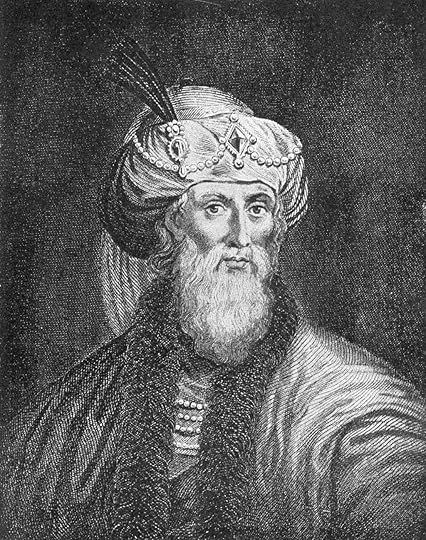 Josephus
JosephusWhether he lived or not is not a matter of debate among scholars. Most scholars relevant to the field agree that he did live. However, an increasingly popular movement is growing which argues that there was no such person as Jesus. This movement, known as the mythicist view, argues that the historical Jesus did not exist. He is a creation, a propaganda tool, a fabricated religious myth. To try to find out who the historical Jesus was, it is important for me to elaborate on why I think there was such a person. As a non-Christian and a staunch atheist, I have no “skin in the game”. My belief in the existence of Jesus comes from a careful scrutiny of evidence, not from a deep faith. If you’re a Christian, you might nod your head as you read this section but I must warn you that I have no intention of defending Christianity(whose tenets I will critique in the succeeding sections).
It is true, as the mythicists claim, that we do not have a single physical archeological evidence for the existence of Jesus. The archeological evidence that Christians think we have are not enough to conclusively prove the existence of Jesus. Some of these have been conclusively refuted. The Shroud of Turin(alleged to be the burial cloth of Jesus),for instance, has been proven to belong to the 12th century. Thus, when it comes to archeological evidence, we virtually have none. This is because the archeological evidence that we do have from first century Palestine largely covers aristocratic upper class Jews. There is no reason for us to expect any archeological evidence, given that Jesus was a lower class Jew and like most lower class Jews, his existence was never mentioned.
Even for the existence of the powerful Roman prefect Pontius Pilate, we barely have any archeological evidence(barring some coins and one damaged inscription discovered only in the 1960s).
Neither do we have any Greek or Roman authors mentioning Jesus during his lifetime. This could be surprising for the modern reader, given how far we have come. However, barely 10% of the population were educated in ancient times. To be more specific, during the lifetime of Jesus, only 3% of Jews who lived first century Palestine(where Jesus lived) were literate. “Literacy” here does not mean the ability to write and read complex sentences. The majority of these “literate” people would have only been able to write their names and copy works. Among the “literate” Jews, almost everyone was from the upper class. The lack of any written work from Jesus himself(who in all likelihood was illiterate) or his direct disciples isn’t surprising.
What we do have is reliable non-Christian/Jewish sources which mention Jesus within a century of his death. Among the Roman authors, Jesus is mentioned by Pliny the younger, Tacitus and Suetonius. Written in 112 CE, some 82 years after the death of Jesus, Pliny mentions the Christians as a nuisance defying the then forbidden act of groups coming together. They were worshipping Christ as God. Tacitus, writing around 116 CE, provides us with more information about Jesus. While mentioning the persecution and execution of Christians by Nero, Tacitus writes:-
“The author of this name, Christ, was put to death by the procurator, Pontius Pilate, while Tiberius was emperor; but the dangerous superstition, though suppressed for the moment, broke out again not only in Judea, the origin of this evil, but even in the city [of Rome].”
The authors in question had no reason to falsify the narrative, given that they were anti-Christians. It is quite evident through these writings that existence of Jesus was not doubted. The best source that we have about first century Palestine are the works of the Jewish historian Flavius Josephus. Almost everything that we know about the period that Jesus lived in comes from Josephus’ “Antiquities of the Jews”. We know from his work that the name Jesus was very common given that there are multiple Jesus’ mentioned throughout. Two of the references directly talk about the Jesus of Nazareth. The more reliable one refers to Ananus’ execution of James, “the brother of Jesus, who was called Christ”. Josephus was a staunch Jew, thus the sentence “who was called Christ(roughly translates to messiah)”, should be read here in a descriptive, even mocking tone.
This does not tell us much about Jesus himself, neither does it conclusively prove the existence of Jesus. To understand more about the historical Jesus, we need to look up to the gospel and Christian writings as historical source(they happen to be the earliest). The common objection would be the obvious biased nature of the gospels. However, we cannot discard documents simply because they are biased. We don’t discard Josephus or Tacitus or Sima Qian just because they were biased. We recognize their biases and then provide a rough approximation of the truth based on what we know about the writers and the historical background in which they were writing. When we do the same with the gospels/new testament, the results are very interesting, to say the least.
Contrary to what evangelical Christians believe, the Gospel weren’t written as eyewitness accounts. The first Gospel of the canonical Gospel(Mark) was written around 40 years after the death of Jesus. The Gospels weren’t written in Aramaic(the language that Jesus and his followers spoke) but in fluent Greek by believing Christians. We don’t know much about the authors themselves. The Gospel writers had a purpose but that purpose was not to write inerrant divinely-inspired scripture. Their purpose was to organize a narrative based on oral and textual sources on the life of Jesus. Some of what they wrote were historically accurate, others were made up to serve a purpose(more on this later). Matthew and Luke, written some 10–15 years after Mark, had access to both Mark and another independent source we now call “Q”(Quelle). We know “Q” existed because the stories narrated by Matthew and Luke(which are not found in Mark) are almost completely identical. Moreover, Luke explicitly tells us that he used many sources in the very beginning of the gospel(Luke 1–4):-
“Many have undertaken to draw up an account of the things that have been fulfilled among us, just as they were handed down to us by those who from the first were eyewitnesses and servants of the word. With this in mind, since I myself have carefully investigated everything from the beginning, I too decided to write an orderly account for you, most excellent Theophilus, so that you may know the certainty of the things you have been taught”
How many exactly? We don’t know. But we do know that Luke includes stories which are neither found in Mark nor in Matthew(ex- good Samaritan). It is extremely likely that these stories were sourced either from a written text or from oral tradition. Apart from the canonical Gospels, we have gnostic gospels like Gospel of Thomas and Gospel of Peter. The latest canonical Gospel(John) is almost entirely different from the other three. Combining all these(Q,L{Luke’s source},M{Matthew’s source}, John,Mark,Matthew,Luke) we know for certain that there are 7 independent accounts, across diverse geographical boundaries, of the life of Jesus within 60–70 years of his death(barring the oral traditions).
We know that the stories themselves are much, much older and actually have Aramaic origins(the language Jesus spoke). This is because the Gospel writers left Aramaic “punchlines”(as Bart Ehrman calls them) in the texts. When Jesus is crucified, he cries out in Aramaic ““Eloi, eloi, lama sabachthani”(my God, my God, why have you forsaken me) which Mark then translates for his Greek readers.
Some of the verses/stories make no sense in their Greek original but when translated back to Aramaic, their message is conveyed. Consider the story where Jesus is confronted by Pharisees when his disciples break Sabbath by eating grains. Jesus answers them:- “The Sabbath was made for man, not man for the Sabbath. So the Son of Man is Lord even of the Sabbath.” Is Jesus saying that he(son of man) can break Sabbath because he created Sabbath? However, in the story its his disciples who break Sabbath, not Jesus. Thus, the last one seems redundant in Greek(Ehrman,2012). However, in Aramaic, the word for both “Son Of Man” and “Man” is the same(barnash). The Gospel writers translated “barnash” in the second line as “Son of Man” in order to make it explicit to their audience that the son of man is none other than Jesus. The right translation would read “So man is lord of the sabbath”, which is perfectly commensurate with the message given in the first sentence.
 Saint Paul
Saint PaulThe most damning evidence for the existence of Jesus comes from the unlikely source of Paul, whose earliest surviving letter dates back to just 20 years after the death of Jesus. Paul, of course, never met Jesus. But he did meet James, the brother of Jesus(whose existence, as we have seen, is attested by non-Christian sources) and the disciple of Jesus-Saint Peter. Paul’s letters provides us with a timeframe. We know that he had converted to Christianity before 40 AD because he mentions being persecuted by King Aretas, who died in 40 AD. Paul initially persecuted Christians before he converted into one. The conversion is dated around 31–36 AD. This would entail that within a year after Jesus’ death, Paul was not only aware of Christians but was actively persecuting them. Why was Paul persecuting followers of Christ? Because the old testament is quite explicit in its mention that the messiah is a triumphant God-like figure, who will rule over Israel and take it away from the oppressors. The messiah was never supposed to be crucified. Crucifixion was an embarrassment for early Christians. “Everyone who hangs on a tree is cursed”(Deuteronomy 21:23), says the Old Testament, referring to public humiliation of those guilty of capital offences. The reason crucifixion is mentioned is not because it fulfills old Testament prophecy but because the one thing that everyone knew for sure about Jesus was that he was crucified. In other words, they had to mention it because it was true.

But who was he? Who was Jesus of Nazareth? How did he become the most influential figure of Western civilization? What did he preach?
In first century Palestine, figures like Jesus were not rare. These self-proclaimed prophets/miracle-workers were said to have healed the sick and raised the dead. Many of them were also believed to have been ascended to heaven. Appollonius of Tyna, who lived around the same time as Jesus, was perhaps the most popular of these figures. The similarities are not proof that these figures did not exist at all. On the contrary, we know for sure that many of them did exist. Its just that the archetypes of that era seem too unbelievable to us. We have our own, albeit sometimes believable, archetypes. The rag to riches story. The underdog. The tragic/misunderstood genius.
Unlike wealthy educated preachers like Appollonius, Jesus was born in a lower class family in an entirely unremarkable village called Nazareth. It is extremely likely that he was illiterate. He is called a “tekton” i.e. carpenter(Mark 6:3), which during his time was akin to our contemporary minimum wage jobs(perhaps worse but not better). That we still remember him instead of hundreds of his contemporaries who preached a similar apocalyptic message is surprising, to say the least. These contemporaries are not nameless. All or most of them were executed in a similar manner as that of Jesus- Simon of Peraea, Simon bar Giora, Judas the Galilean etc. In fact, Judas the Galilean is explicitly mentioned in the New Testament(Acts of Apostles), where Gamaliel warns in a speech that the followers of Christ will end up having a similar fate as that of Judas the Galilean.
Jesus preached about the kingdom of God, the coming of the Son of Man, “in the glory of the Father with the holy angels”. Those who do evil will be “cast unto the furnace of fire”. When will this Son of Man come? In his own generation. Jesus is quite explicit about this in the earliest gospel:-
And he said to them, “Truly I tell you, some who are standing here will not taste death before they see that the kingdom of God has come with power.- Mark 9:1
Truly I tell you, this generation will certainly not pass away until all these things have happened.- Mark 13:30
He is the messiah. He is one with God, claims John. Jesus is the Son of man. A divine being. It is only in the Gospel of John(the most recent one) that Jesus is unambiguously the son of God. The other gospels do imply he was the son of God but at the same time contain verses(such as the ones above) where the Son of God is referred to in the third person. It is likely that Jesus did not in fact think of himself as the literal Son of God(which was a later doctrine, the term itself, along with Messiah, is used often for kings and prophets in the old testament).
Who gets into the kingdom of God? This goes into what I consider to be the heart of his teaching. The son of man will separate people in the same manner the “shepherd separates the sheep from the goats.” To his right, he will welcome the people to the kingdom of god for “I was hungry and you gave me something to eat, I was thirsty and you gave me something to drink, I was a stranger and you invited me in, I needed clothes and you clothed me, I was sick and you looked after me, I was in prison and you came to visit me.” Perplexed, the righteous ask “Lord, when did we see you hungry and feed you, or thirsty and give you something to drink? When did we see you a stranger and invite you in, or needing clothes and clothe you? When did we see you sick or in prison and go to visit you?”. He answers “whatever you did for one of the least of these brothers and sisters of mine, you did for me.”
This theme shows up again and again. Jesus was not simply advocating for the oppressed, he was advocating for a utopia. A Kingdom where the rich will not be allowed. He does not just say “blessed” are the poor, the peacemakers, those hungry, the hated and those who weep. He also says “But woe to you who are rich, for you have already received your comfort. Woe to you who are well fed now, for you will go hungry. Woe to you who laugh now, for you will mourn and weep. Woe to you when everyone speaks well of you, for that is how their ancestors treated the false prophets.”
The Kingdom of God is not for the rich. This message of Jesus had clear political implications. It was a provocation, a call to resistance, perhaps even a rebellion against the Romans and the elites. It is for this crime, this message, that he was crucified. This is further attested by the fact that he “overturned the tables of Money” and drove away sacrificial animals from the temple. He accused the priests of having turned it into a “den of thieves”.
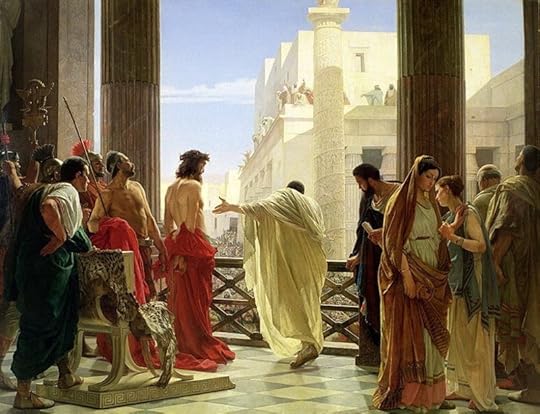 trial of Jesus
trial of JesusThis was the last straw. Calling himself the “king of Jews” directly questioned the authority of Romans. He had to be taken out lest he explicitly challenges the Romans.
It is most likely not true, as Reza Aslan argues in his beautifully written book “Zealot”, that Jesus was advocating for a violent rebellion(if he was, it was most definitely not a part of his public ministry). A consistent theme throughout the New Testament is the pacifist message of Jesus. He asks his followers to love their enemies, turn the other cheek, do good to those who hate them and pray for those who persecute them.
As his disciple and betrayer Judas Iscariot identified him to the authorities, one of the disciples slew the ear of one of those who had come to arrest him. Jesus admonished him saying “Put your sword back in its place, for all those who draw the sword shall perish by the sword”. While this scene is consistent with the pacifist teachings of Jesus, it does raise some objections. Why, for instance, were the disciples of Jesus armed? It is most likely that they were not armed. Had they been armed, indeed, had they attacked the soldier, they would have been arrested along with Jesus. The narrative was probably created by the early followers of Jesus to justify/illustrate the “punchline”(which was likely a part of Jesus’ actual teachings).
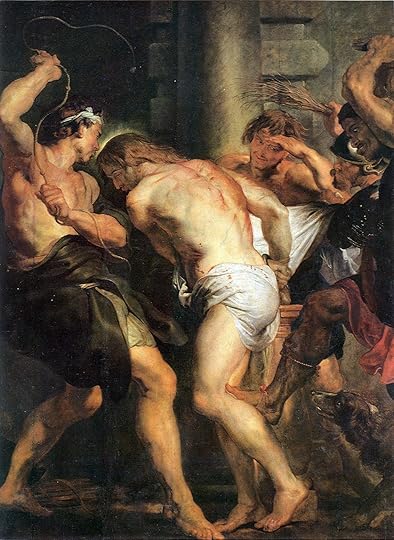 Flagellation of Christ
Flagellation of ChristAfter the Romans condemned him to crucifixion, he was stripped and scourged in a barbarian manner(standard procedure). He carried the heavy cross, in all likelihood covered in wounds and wearing a crown of thorns, to a place called Golgotha(Calvary) where he was to be crucified. He must have been jeered on as he walked towards his death. Crucifixion shouldn’t simply be understood as capital punishment. The rituals accompanied it had a specific purpose. Crucifixion was reserved for the worst sorts of criminals, the ones who conspired against the state. Its purpose was to publicly humiliate the victims. To warn the public that this crime will not be tolerated. It was a spectacle of the worst kind. Thus, it might surprise people that Jesus is crucified alongside two “thieves”. Most popular translations use either “thieves”, “robbers” or “criminals”. Why would thieves be crucified and publicly humiliated? The original word used to refer to those crucified alongside Jesus in the gospels is “lestai”,who, according to Josephus were Jewish “bandits” rebelling against the Romans. Jesus, too, was crucified for sedition. This was uncomfortable for the Gospel writers as it had clear political implications and their aim was to write about Jesus, the resurrected son of God and not Jesus the rebel. This is why it is the Jews, and not the Romans, who are responsible for the crucifixion(according to the Gospels). The Roman prefect Pontious Pilate washes his hands off and declares “I am innocent of this man’s blood”. This scene is completely ahistorical and contradicts everything we know about Pilate, who was so cruel that he was removed by the Romans from his post for his slaughtering of Samaritans. The Gospel writer’s attempt to remove the political connotations is made explicit when Luke changes the term “lestai”(bandits/revolutionaries) to “kakourgoi”(evildoers).
Condemned of sedition, Jesus dies in intense agony and pain. He cries out “My God, My God, why have you forsaken me?”. His God did not save him from intense suffering. In his last moments, Jesus must have felt a moment of doubt. About the goodness of his creator. If not his existence itself. He was, after all, a human being.
The Jesus of history is much more compelling than Jesus Christ. Jesus Christ knew he was going to die. He came to suffer. He was a divine being. He knew he was going to be resurrected. He was not of this world but of the heavens. He was the logos. The Jesus of history, on the other hand, was born in a relatively remote village(Nazareth) to a family of low class carpenters. The Jesus of Nazareth preached non-violence and the coming of a just kingdom. He exalted the oppressed. Washed the feet of his disciples. Challenged the elites, the rich, the high priests and the authority of one of the most powerful empires in history. For these beliefs, he died. Neither his sufferings nor his teachings were in vain. The fact that I’m writing this 2000 years later attests to that. This Jesus, to me, is much more compelling than the one who performs miracles and raises the dead.

June 10, 2021
Uncovering India’s COVID crisis
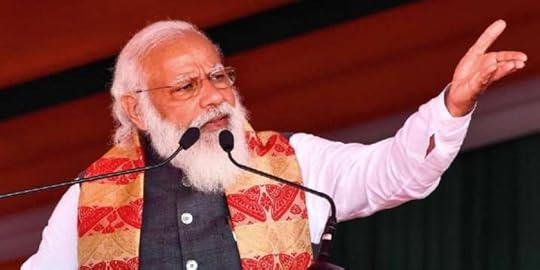
After months of demanding centralization of vaccines by experts and opposition parties alike, the Narendra Modi government has finally caved in. While announcing this, the Prime Minister claimed that earlier India had to wait for decades to procure vaccines while under his govt India is self-sufficient. This claim is grossly exaggerated. There is evidence, for instance, that the precursor to modern smallpox vaccine(inoculation) had its origins in India and China as late as the seventeenth century. The first smallpox vaccine was administered in India only over 5 years after its discovery(1802). The first vaccine laboratory was built in 1899. Though the initial trajectory was slow, India successfully eradicated smallpox in 1975. Five years later, WHO declared the world to be smallpox free. India was actually self-sufficient in vaccine manufacturing at the time of independence. The PM also claimed that “Mission Indradhanush” has led the country’s vaccination coverage to increase from around 60% to 90%. This directly contradicts the latest official govt data which clearly suggests that most states have not achieved 90% vaccination coverage yet.
Putting aside the glaring factual inaccuracies, one needs to look broadly at the government’s management of the pandemic to determine whether it has in fact succeeded or failed. The BJP has accused critics of having “vested political interests”, not to mention the disgraceful ad-hominem of “low IQ”. Does this claim stand out in the face of scrutiny?
India was clearly not prepared for the pandemic. After 2000, the growth of health spending in most lower middle income countries outweighed the growth of GDP. India has been an exception to this. India ranks 145 out of 180 on quality and access of healthcare and 179 out of 189 countries when it comes to prioritization of health in budget. India’s hospitalization rate is also among the lowest in the world. We have a deficiency of both infrastructure and quality healthcare, which is illustrated by the steep increase in communicable diseases(see graph).
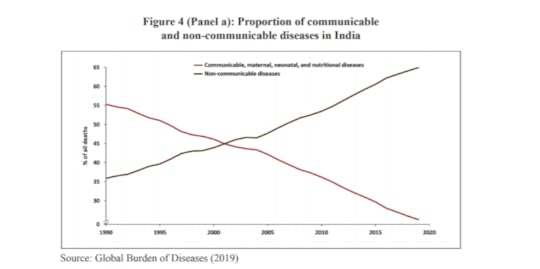
The Indian government’s latest economic survey explicitly points out that India’s healthcare spending is similar to “donor-dependent countries” like “Haiti and Sudan” while being well “short of its peers in development”(graph 2, Economic Survey 2020–21)

Given this background, the government’s handling of the first wave was predictably disastrous. India imposed one of the strictest lockdowns. The lockdown was announced with just around 4 hours notice with barely any preparedness. One would have expected the Modi government to have learnt their lessons from the disaster that was demonetization. However, this government seems to have a pattern of incompetency. What unfolded in the succeeding months was an artificially created(and avertable) migrant crisis, resulting in hundreds of unnecessary deaths including 12 from police brutality.
The maladministration of the first wave(barring the avertable migrant crisis) can still be blamed on incompetency as no country really knew how fatal or infectious the virus was. The same cannot be said about the second wave. As the cases were rising up and deaths were piling up, the government decided to completely ignore it. The people were to blame, according to the health minister Dr. Harsh Vardhan. It was the people who were not taking COVID protocol seriously. It was the people who were not wearing masks. Interestingly, it was the BJP’s Himanta Biswa Sarma(then health Minister and now Chief Minister of Assam) who asked people not to wear masks and “create panic”. The govt’s decision to allow gathering of millions of pilgrims in the Kumbh Mela helped spread the virus. The Chief Minister of Uttarakhand removed “unnecessary restrictions” and claimed that “faith will overcome the fear of COVID-19”.

When thousands were dying daily due to oxygen shortages, the Prime Minister was busy gloating about “huge crowds” at election rallies. At the same time, the Health Minister was busy prioritizing and fast tracking “cow science” to look into cures for diseases like “diabetes and cancer”. In light of these facts, it doesn’t seem surprising that the govt cares more about its “image” than actual human lives. This reveals an utter lack of regard for human lives. Everyone dying now is a victim of state malevolence, not COVID.
When the Narendra Modi govt came to power in 2014, many saw it as a victory of the Hindutva ideology. Now, even the chief of the Hindu nationalist organization RSS has critiqued the government for dropping its guard. Sensible voters believed that this government will change history books in order to make it more inclusive of regions other than the North. It is true that most history books tend to be written from a Delhi-centric perspective leaving out significant events like the Paika rebellion of 1817 and significant figures like Marthanda Varma of Travancore. However, this government did nothing to change textbooks. What it did do, however, is sneakily add a section in the CBSE class 12(of which I’m a student) political science book extolling the government. I reproduce the section below: -
“A major change in Indian politics after 2014 is the shift from caste and religion based politics to development and governance oriented politics. With its pre-intended goal Sabka Saath, Sabka Vikas, the NDA III Government started several socio-economic welfare schemes to make development and governance accessible to the masses….All these schemes intended to take administration to the doorstep of the common man by making the rural households, particularly the women, real beneficiaries of the Central Government schemes. The success of these schemes could be seen from the results of 2019 Lok Sabha elections where the voters across states — castes, classes, communities, gender and regions brought back the issues of development and governance to the centre stage under the BJP led NDA Government characterizing the current change with ‘Sabka Saath, Sabka Vikas and Sabka Vishwas”
This section is not just explicit propaganda but also runs contrary to facts. BJP leaders have time and again inflamed communal passion and advocated directly for “control of state power by Hindus”. The BJP is directly responsible for creating an atmosphere of polarization and a politics based on assertion of Hindu identity. The battle against Mr. Modi, however, is not simply ideological. It is a battle against a cult of personality formed around the Prime Minister. While Mr. Modi is an avowed Hindutva ideologue, he has also shown his willingness to let thousands die(Delhi riots, Godhra, pandemic etc.) if it helps him win elections. It is not enough to blame his failures on incompetency. A single mistake can be blamed on incompetency. But a pattern of mistakes must be blamed on malevolence.

February 16, 2021
Morality without God:The case against religion

A few days ago, popular conservative/classical liberal commentator and talk show host Dave Rubin tweeted a thread outlining his reason for why our society is collapsing. There is, of course, an argument to be had about whether our society is collapsing at all. As Steven Pinker argues in Enlightenment Now, our society seems to be heading towards a generally progressive direction. However, for the sake of argument, lets assume that Rubin is referring to the worst of our society. In the thread, he specifically refers to “wokeism” and claims that secular liberals have no defense against our collapsing society. Rubin here is basically echoing the rhetoric of his mentors i.e. Jordan Peterson,Ben Shapiro&Dennis Prager. What all these individuals share is a belief 1) that society will crumble without a religious substructure 2) Objective morality is preferable and is not possible without invoking God and 3) “Judeo-Christian” values are superior and form the bedrock of western civilization.
I intend to deal with all three of these arguments but first we must define what morality is.
Defining MoralityThe Oxford dictionary defines morality as “principles relating to right and wrong or good and bad behaviour”. Thus, morality is the distinction between good and bad,right and wrong. Even though its a component of defining morality,for the purposes of this article its not enough. When we generally talk about morality, we dont just talk about distinctions between good and evil but also that we need to do what’s good and not whats bad. This distinction is crucial and will be of use to us later in the article.
Further, moral systems can be defined as “interlocking sets of values, virtues, norms, practices, identities, institutions, technologies, and evolved psychological mechanisms that work together to suppress or regulate self-interest and make cooperative societies possible”(Haidt). When the likes of Peterson claim that western society is founded on “Judeo-Christian” values,they’re saying that the moral system that western society adheres to is “Judeo-Christian” in nature.
Judeo-Christian Values
The idea that the entire western civilization is founded on a Christian god of morality is a relatively recent fabrication. Yet, it is a principle widely adhered to by many orthodox Christians as well as conservatives. The conservative commentator Ben Shapiro, for instance, claims that “the values that resonate most with human are eternal. They are universal.” According to Shapiro, these values are embedded in the Ten Commandments. The same beliefs are echoed by other conservatives like Dennis Prager and Steven Crowder. Jordan Peterson, the most influential public intellectual in the Western world according to NYT, claims that in “order to make a rational argument,one must start with an initial proposition and the proposition that underlies western culture is a transcendent morality”.
In the 2016 election, Christian nationalism was “the only significant religious predictor of voting for Trump”. The idea that western world in general and America in particular was founded on Judeo-Christian values is a standard conservative belief. It has been re-iterated by the likes of Donald Trump, Marco Rubio, Ted Cruz, Rick Santorum etc. etc.
While the term itself is not vague,the arguments underlying it are not only notoriously difficult to define but also equally difficult to find. There are,of course,many arguments for the belief that objective morality is not possible without God/religion(we’ll deal with this later in the article). This is not the same as the statement that Judeo-Christian values are the foundation of Western civilization. This proposition is taken as an axiom.
The phrase in question was initially used as a descriptive term to refer to Jewish converts to Christianity. It was only in 1940s-50s that the term gained traction as a shared value system between Judaism and Christianity. This belief seems to havemade its way,at least partially, to some US local courts. For instance, former Judge James Taylor displayed the ten commandments in his courtroom. He believed that the religious faith of America’s founding fathers considerably influenced the creation of Constitution and the institutions of government.
This claim is not just absurd but extremely easy to falsify. The only times US Constitution mentions religion is to separate religion from the state. The first law to be passed in the United States was “An Act to regulate the time and manner of administering certain oaths”. The initial proposal contained two clauses mentioning God(“in the presence of Almighty God”&”So help me God”). Both were seen as anti-thetical to the principle of separation of church and state and were thus excluded for good. In 1862, at the height of the civil War, both sides claimed that God was on their side. Both sides quoted the Bible. The confederates quoted it to justify slavery while the abolitionist quoted it in support of their opposition to slavery. However, it was only the confederate States of America which officially included the mention of God. The Preamble of the confederates were the same as the the preamble of the United States with one major difference. The confederates included the line- “invoking the favor and guidance of Almighty God”.
It was in this background that Mark Watkinson, a pastor, wrote a letter to Salmon P. Chase(the then US Secretary of Treasury). Watkinson claimed that “the recognition of the Almighty God in some form on our coins” has been “seriously overlooked”. He warned that future generations would judge America as a “heathen nation” based on the heathen emblem of “Goddess of Liberty” which then featured prominently in American currency. Watkinson was certain that “no possible citizen would object to this”. Further, it will relieve the Union from “ignominy of heathenism”. Chase recommended the same to the director of Mint James Pollock(who happened to be a strong Christian). Pollock considered America to be a “Christian Nation” and so had no problem with the suggestion. This is how the phrase “In God We Trust” came to be inscribed on American currency. The Founding fathers themselves decreed coins which were “emblematic of liberty”(Hamilton’s suggestion). One of the coins had “Liberty:Parent of Science and Industry” inscribed in it. As the US constitutional lawyer Andrew Seidel writes in his magnificent book “The Founding Myth”, “The three fearmongers of the 1860s(Pollock,Chase&Watkinson) sought to undo the work of these great men. The original idea expresses(E pluribus Unum)the belief that people or states with differences can come together to form a great country. The religious myth expresses an inherently divisive religious belief and applies to only a portion of the population”
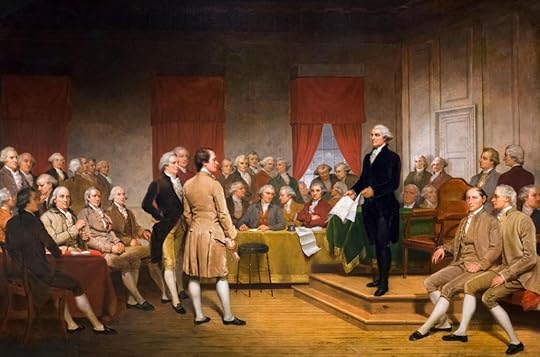 the founding fathers of USA
the founding fathers of USAAs far as the religion of the founder fathers is concerned, it is true that many of them were indeed Christian. Some, however, stood out for their opposition to orthodox Christian. All of them agreed on one principle:- the strict separation of the church and state. George Washington, for instance, advocated “the absence of any regulation respecting religion from the Magna-Charta of our country”. James Madison wrote “The experience of the U.S. is a happy disproof of the error so long rooted in the unenlightened minds of well meaning Christians, as well as in the corrupt hearts of persecuting Usurpers, that without a legal incorporation of religious & civil polity, neither could be supported.” Thomas Jefferson considered himself to be an “epicurean”. The Epicurean conception of God is much closer to deism than it is to Judaism or Christianity. Epicurus thought Gods were made up of atoms. They were supreme beings who did not concern themselves with human affairs. Instead, they simply idled away in a higher sphere. Jefferson created his own Bible by removing almost all mention of the supernatural in the New Testament. Thomas Paine was more vocal in his opposition to Christianity and organized religion. He claimed that “more than half” the Bible was full of “obscene stories,voluptuous debaucheries, the cruel and torturous executions and unrelenting vindictiveness”. He claimed it’d be more consistent to refer to the good book as the “word of demon” than the word of God. Even if the founding fathers were all devout evangelical Christians, this would not make the United States a “christian nation”. It is clear from the many documents that we have that they wanted a strict separation of the church and state.
Instead of looking at what the founding fathers thought about religion, shouldn’t we look at the morals/rules that the Bible prescribes? The claim is not merely that America was founded on “Judeo-Christian” values but that western civilization as a whole was founded on those values. As I have mentioned above, the likes of Shapiro think it is these values which are eternal.
Are the ten commandements,which are considered to be fundamental to both Judaism and Christianity, the backbone of western civilization? Are these ideas reflected in the law of the land? We need to keep in mind that there are different sets of the so-called ten commandments in the Bible. However, the ones shown in Cecil DeMille’s cinematic masterpiece remain the most popular, for cultural not theological reasons. The first few commandments are affirmations of monotheism(historically monolatrism but popularly monotheism,See Wright, Robert. 2009). God prohibits the Israelites to worship other Gods, make “graven images/idols”, take the Lord’s name in vain and keep the sabbath holy. These first four commandments are clearly opposed to the values and principles followed by most secular democracies. In fact, Pope Leo XIII used these commandments to proclaim that it is “unlawful to demand, to defend, or to grant unconditional freedom of thought, of speech, or writing, or of worship, as if these were so many rights given by nature to man”
These commandments aren’t as simple as they might seem from a first look. If one reads the commandment in their entirety,a more horrifying image emerges(considering the fact that they are already horrifyingly absurd). The fourth commandment recognizes slavery and also differentiates implicitly between Israelites and “foreigners/alien residents”(as we shall see, God seems to be a tribalist)- “You must not do any work — you, your son or daughter, your male or female slave, your ox or donkey, any of your livestock, or the foreigner who lives within your gates, so that your male and female slaves may rest as you do.”
In case this does not appear as an explicit endorsement of slavery, consider the verse below:-
“As for the male and female slaves whom you may have, it is from the nations around you that you may acquire male and female slaves. You may also acquire them from among the aliens residing with you, and from their families that are with you, who have been born in your land; and they may be your property. You may keep them as a possession for your children after you, for them to inherit as property. These you may treat as slaves, but as for your fellow Israelites, no one shall rule over the other with harshness”. — Leviticus 25:44–46
This verse not only endorses debt-slavery but hereditary slavery. Precisely the kind of Slavery which was prevalent during the civil war. This point is re-iterated in Exodus 21:4, which states that children of slaves are born into slavery. The Bible even endorses the beating of slaves, only emphasizing on regulation but not abolition. For instance, Exodus 21:20–21 states that the master is to be punished if a beaten slave dies but not if the beaten slave survives a “day or two” for “the slave is the owner’s property”. The New testatement also endorses slavery( here and here). Jesus himself references slaves in his parables without a hint of condemnation,even going so far as to recommend beating. Ben Shapiro claims that this is a “simplistic reading”. The Bible, according to Shapiro, was written in a way so that it’ll be easier for the people to understand. Since slavery is a “human universal”, God narrated the rules in a way in which people will be easily convinced. Thus, slavery was meant to exist only for a certain period. The problem with this argument is that it has no scriptural support. Nowhere in the scripture does it say or even imply that God wanted slavery to exist just for a while. Moreover, this argument goes against the idea of an “objective morality”. Abolition of slavery came not due to Christianity, but despite it. Many non-”Judeo-Christian” cultures,like the Greeks, the Indians and the Chinese, had abolished slavery completely or partially even before Christianity was instituted as a religion. The idea that humans were incapable of comprehending the immorality of reducing another member of their own species to mere property is falsified by the fact texts arguing against slavery existed around the same time and even in the same places where Christianity/Judaism emerged(Read this and this). One can also cite examples of Biblical sexism(here, here , here, here, here,here,here and here ) and homophobia to prove that the Bible is not a good moral guide. In fact, if you or I had the opportunity to write the Bible, it’ll be infinitely more moral than it is now(presuming that you dont support slavery or sexism). The same problem arises with most other religions. I’m not discussing them here because the point remains the same(and this piece is already long enough).
When Jordan Peterson discusses “Judeo-Christian” values,he’s not referring solely or primarily to the Bible. His argument and definition is very different from the definition that most of us are aware of. He has accused Sam Harris of not dealing with the “heavy hitters”. Who are these “heavy hitters”? Dostoyevsky, Jung, Eliade but most importantly Nietzsche. Which brings us to…..
Nietzsche’s Christianity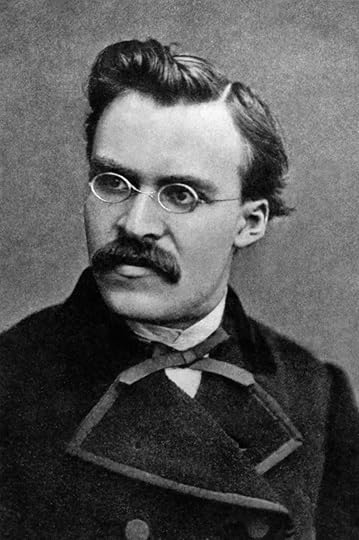 Nietzsche
NietzscheThe German philosopher Friedrich Nietzsche thought that suffering was an integral part of human existence. In this, he was no different from Arthur Schopenhauer, who proclaimed that “suffering” can be legitimately seen as “the direct and immediate object of life”. For Schopenhauer, suffering was the general norm. Nietzsche disagreed only slightly. Suffering was simply a symptom for him. The problem was “the senselessness of suffering” which “lay spread over humanity”. Religion or the “ascetic ideal” as Nietzsche referred to it answers this question. Religion provides a meaning to our suffering. Once the senselessness of suffering is answered, we actively “seek out” suffering. The Islamic terrorist is willing to die for the “ascetic ideal”. But so does the political radical. It was this “ascetic ideal” which closed “the door to all suicidal nihilism”.
For Nietzsche, Christianity’s essense was not in the ideas of salvation, resurrection, heaven, hell, trinity, miracles, existence of a supernatural diety etc. The essence was its adherence to dogma itself. It was this “will for truth” which laid the foundation of the religion. This “will for truth” can be generally understood as the belief that there exists one ultimate objective truth. According to Nietzsche, atheism is not the opposite of the “ascetic/Christian” idea but its most “severe” and “clever” formulation, one which keeps the “kernel” and “strips its outwork”. “Unqualified honest atheism” is the final phase of the evolution of the ascetic ideal. Christianity turned against itself. It was this adherence to the truth, the “Christian morality” which leads a Christian to atheism. Just like Feuerbach used Hegel’s method against himself, Nietzsche used Christianity(or his definition of it) against itself. Nietzsche writes“unqualified will for truth is the faith in the ascetic ideal itself”. Even Science cannot exist without a hypothesis/philosophy. An example of this philosophy today would be Karl Popper’s idea of empirical falsification.
Another value which Nietzsche credits Christianity with is the value of compassion. He thought Christianity was a religion of pity, valorizing the weak, the poor over the strong.In this sense, the communists, socialists and enlightenment thinkers were actually putting forth a version of radical Christianity. This assertion would obviously be too far for conservatives to take. Jordan Peterson, for instance, claims that it is impossible for a Christian to be “Marxist”. It might also interest fans of Peterson to know that one of the “heavy hitters” arguing for religion that Peterson cites happened to believe that anarchism was inherent to Christianity(Leo Tolstoy,who is also one of my idols). On the other hand, Nietzsche also despised the Christian idea of “sin” and the fact that perfection, the “highest good” is unattainable. The Christian, according to him, hated “intellect, pride, freedom, courage and joy”. The Christian also hated himself and others, particularly the unbelievers. Thus, there is a “will to persecute” in Christianity. He contrasted Christianity with Buddhism. He saw Buddhism as the “only positive religion” which is “hundred times as realistic as Christianity”. Buddhism is “objective” and “yields to reality”. In this sense, Nietzsche is actually much closer to Sam Harris than he is to Jordan Peterson. Nietzsche was a staunch but nuanced critic of Christianity.
He denounced the “idea of equality” as an insane Christian idea,which manifests itself in the political form as socialism and utilitarianism. Nietzsche distinguished between “noble morality” and “slave morality”. For the purpose of this article, I’ll simplify the terms. Noble morality is essentially the kind of morality which asserts the superiority of certain “excellent” individuals. There is an implicit agreement in society about the superiority of some. Nietzsche actually cites the Indian caste system as an example of this. In fact he prefers this kind of morality over slave morality, which according to Nietzsche, emerged as a revolt by the oppressed and demands equality of all. Nietzsche was an anti-egalitarian. He supported slavery and believed that all morality is mere interpretation(though he clearly preferred one over the other). His scepticism of truth is partly why almost all postmodernists are influenced by him. Its also why Christians admire him. The likes of Peterson claim that without the metaphysical substructure, society would break down. This is what Nietzsche meant by the “death of God”. “The death of God” was an event worth mourning. With it, humanity lost its moral foundation which would naturally give way to nihilism. Since almost nobody considers Nietzsche’s version of morality or his idea of the “eternal return” to be a practical solution, it follows naturally that “Judeo-Christian” values are the best solution at hand.
But are they? Peterson defines “religious” as “what you act out”. Everything that a human acts out is predicated on implicit axioms, says Peterson, and since everybody has certain axioms everyone is religious even if they claim not to be. The first problem with both Nietzsche and Peterson’s definition is that of redifinition. There is a colloquilly understood definition of “religious/Christian” which everybody agrees on. What Peterson does is redefine the term in such a way that everyone qualifies for being “religious”. This is mere word-play. Let me illustrate this with an example:- say,I redefine “atheist”as anyone who doesn’t believe in the existence of Zeus. Under my definition, the overwhelming majority of world’s populations would be “atheist”. It’d quite simply be absurd for me to do so. There’s a reason specific definitions exist. It is ironic that Peterson has accused the “radical leftists/postmodernists” of redifining specific definitions when he himself is guilty of the same.
Scientific skepticism or the belief in an objective truth is neither a “religious” value nor a “Judeo-Christian” value. Louis Liebenberg has observed the scientific method among the hunter gatherers of the indigenous San people. The San people engage in inference i.e. they track animals through their spoor,determining age,sex and “direction of flight” as well as deduction and reasoning. The arguments from authority is not accepted. Majority opinions are allowed to be challanged and if the group is convinced by “evidence”, it is accepted. This helps in increasing their chances of “accuracy”(Pinker, 2018). It seems like Christianity doesn’t have a monopoly on “truth”. The idea of dogma,objective truth as well as the earlier manifestation of the scientific method can be found in many cultures. Empiricism,reasoning and skepticism, for instance, are elaborated/appear in many ancient Indian texts long before the enlightenment. These traditions even inferred the non-existence of God and asserted the truth of only that which can be verified through perception and experiment.
Some have argued that it is due to the “Judeo-Christian” value of the the protestant work-ethic that capitalism and individuality emerged. It is true that protestant-work ethic is a real phenomenon. However, it emerged despite the scripture not because of it. It used the same narratives/heroes to tell a different story with fundamentally different values. The idea of predestination and the belief in work as sacred is in no way unique to protestanism. In the Bhagavad Gita, Krishna asks Arjuna to “perform his prescribed task” since it is only by “work” that “ancient saints reached blessedness”. Arjuna is advised to perform work regardless of the outcome(Make thine acts thy pity). This is an integral idea in Hinduism.Yet, capitalism did not develop in India. As Weber points out in his work, it is not just protestant work-ethic which led to the growth of capitalism. It is protestant work ethic along with a variety of other factors(systemized government,for instance) which led to the growth of capitalism. A multivariate analysis would reveal as much.
The evolutionary origins of moralityMorality has an evolutionary origin. Before discussing morality in human beings, we must discuss precursors to morality which non-human animals exhibit. The popular skeptic and historian of scince Dr. Michael Shermer refers to these sentiments exhibited in animals as “premoral” since we don’t know yet whether they can comprehend the “rightness or wrongness” of their own behavior. Gerald Wilkinson’s research has shown that bats exhibit a form of reciprocal altruism. They not only share blood with each other but they have developed what Wilkinson terms as “buddy system” which ensures equitable food distribution. In this system, bats pair up with each other and share food from “night to night”. For instance, if a bat fails to get blood,then her/his “buddy” will share food.

The primatologist Frans de Waal has conducted lots of research on altruism in chimpanzees and apes. In one of these experiments, chimpanzees were given two “tokens” of different colors. Choosing the “selfish” token will ensure only they get food while the Chimpanzee next to them(locked in a different cage) doesn’t. Choosing the “prosocial” token will ensure that both the chimpanzees get food. Chimpanzees overwhelmingly prefer the pro-social token. However, when the other chimpanzee tries to force them to choose the “pro-social” token through display of aggression/threat,the choices actually go down. In another experiment done with monkeys, de Waal checked monkey’s reaction to unequal prize. Two monkeys are supposed to pass on a rock in order to get food. There are two different kind of food on the table:- Cucumber and Grapes. Grapes, in monkey land, is a superior food. One of the monkeys gets grapes when s/he passes on the stone while the other gets Cucumber. When the monkey observes this, she/he throws away the Cucumber and starts rattling the cage and banging the table(see this clip). It seems like monkeys too want equal pay/fairness. Other animals, like Elephants, have elaborated mourning rituals when a member of their own species dies.
Paul Bloom’s research on babies and infants has shown that a lot of human morality is innate i.e. we are born with a sense of right and wrong. Religion evolved partly as a control mechanism and partly as an avenue for exchange of goods and services which cannot be attained through secular means. This includes good weather and reincarnation/immortality. This is known as the rational choice theory of religion. Religion is one of the earliest social institutions developed by human beings. As such, it is also the worst. It is interesting to note that religion developed only in tribes which were too large to control. The anthropologist Jared Diamond has pointed out that in New Guinea God is never invoked to justify how a human being should behave towards another. Religion as a social institution served as a way to unite members of in-group against the out-group. Despite adherents of almost all religions claiming their religion to be universal, almost all religion is in fact tribalistic. In Deutronomy 20:10–18, for instance, God asks the Isralites to “lay siege” to a city and “put to sword all the men in it” while the women,children and property should be taken as “plunder”. “Do not live alive anything that breathes” commands the “universal” God. The “in-group/outgroup” distinction is inherent to all human beings. The Israeli psychologist Georges Tamarin asked to over a 1000 school students(aged 8–14) about their opinion of the biblical story of Joshua’s destruction of the city of Jericho. According to the biblical narrative, God saw it righteous of Joshua to burn the entire city and kill all its inhabitants. The students were asked whether they thought it was right of Joshua to do so. An overwhelming majority replied in the affirmative. However, when the story was changed to that of a Chinese General Lin who destroyed and killed the inhabitants of a city based on a command from the “war God”,the majority expressed their disapproval. Religion seems to strengthen tribalism and force us to care less about the well being of people who are not members of our “in-group”.
Objective morality“Is objective morality possible without God?” is the wrong question to ask. The question that we first need to ask is whether objective morality is possible with God. So far we have seen that the values enshrined in holy scriptures are extremely regressive. We have also briefly discussed how the emergence of morality can be explained in naturalistic terms. However, there are many who agree with these statements but still continue to believe that objective morality is preferable and only possible in case of existence of God. As we have seen, the likes of Rubin claim that society will crumble without an existence of a morality external to us.
God can tell us what is right and wrong. This, in fact, can in theory be objectively true if we have specific definitions of right and wrong/good and evil. This will lead us to the Euthyphro dillema. Is good “good” because God commands it or does God command it because it is “good”? In the former case, it merely becomes an argument from authority. In the latter,it makes God redundant since “good” can exist independently of God. The irreligious person does not face this dillemma for she can choose to believe in a subjective or objective morality.
Even if we accept that God defines right and wrong objectively,we’re still left with a dillema. Remember the definition of morality? Morality is not simply the distinction between good and evil,it is also the idea that we should do whats good and not whats bad. Why should we do whats God? Because God asks us to? Why should we do that which God asks us to do?{infinite regress} “Commands/orders” cant by definition be facts. If I say “you should read this article”, I’m not making a factual statement. If your boss asks you to “do the job”, she/he is not making a factual statement. They’re giving you orders/commands(close the door, eat the carrots,do your homework etc.) Similarly when God asks us to do what’s God, he is giving us “orders”. He’s not making a factual statement. The religious person can claim that we need to do whats good in order to go to heaven. Fine but then you’d be making a consequentialist argument,not an argument for “objective morality”.
The statement-“society will crumble without a religious substructure” is a consequentialist argument. In essence the claim is that without religion, the world will be chaotic and everything will be permitted. This is a falsifiable claim. Out of the top 10 ranked countries in the Human Development Index, the majority in 8 countries consider religion to be unimportant(In Norway 78% consider religion to be unimportant, Switzerland-57%, Hong Kong-74%,Germany-59%,Sweden-85%, Australia-68%,Netherlands-67% and Denmark-81%) Religiousity is highest in poorest countries i.e. Bangladesh,Somalia,Oman,Ethiopia,Niger etc. One can find the same pattern when it comes to World Happiness Report. If this proves anything then it proves that there is a negative correlation between development,happiness and religion. We expand our moral circle(to use Peter Singer’s term) despite religion not because of it. Moreover there are many secular alternatives to morality which are infinitely better than the regressive commands of a bronze age deity(Kant’s categorical imperative, Dancy’s moral particularism, social contract, effective altruism, secular humanism etc.).
If our intention is to progress, to diminish animosity towards fellow members of our species, to increase the well being of our society and to fight tribalism and bigotry, then we must cast bronze age superstition aside. We must grow the hell up!

November 18, 2020
Re-evaluating Marx
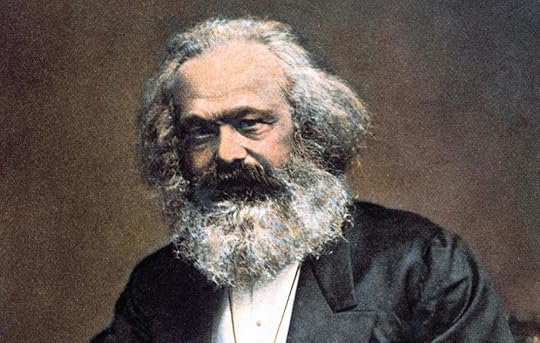
One Hundred and thirty seven years after his death,Karl Marx remains one of the most polarizing figures in our political landscape. Everyone seems to have an opinion on Marx. His critics see him as an irredemable evil totalitarian thinker while his proponents see him as a modern day-prophet. After carefully scourging through popular(but not the most intellectually rigorous) conservative and right leaning criticisms of Marx,I have come to the conclusion that most people have not read Marx beyond “The Communist Manifesto”. As any Marxist thinker would tell you, “The Communist Manifesto” is the worst place to start if you want to get a comprehensive view of Marx’s critic of capitalism. This text, as the Marxist literary theorist Terry Eagleton points out, is a piece of “political propaganda, and as such is full of rhetorical flourishes.”
Popular conservatives are not just wrong in their interpretation of Marxism. They are actually hillariously and embarassingly wrong. To illustrate this, let us pay attention to a man who has been called “the deepest,clearest voice of conservative thought in the world today”. Yes, we’re talking about Jordan B. Peterson. In a discussion with Joe Rogan(and numerous other places), Peterson talks about how Stalinism was an “inevitable consequence of the Marxist system”. What is the goal? Equality of outcome. Our Jungian Hero bravely dismantles Marx by asking “what measure of outcome? You can multiply the dimensions of evalutations between people innumerably. So, everyone has to be equally happy in their relationships?Because there is no place to stop,there will be no stopping. Nothing but a tyrannical system could impose that.”
I absolutely agree with Dr. Peterson. So do Marx and Engels. In 1875, the Social Democratic Party released a party manifesto called “Gotha program” elucidating their goals. One of the goals cited in that manifesto was “the elimination of all social and political inequality”. In other words, equality of outcome. Engels responded by calling it “a most dubious expression”. He wrote “living conditions will always evince a certain inequality which may be reduced to a minimum but never wholly eliminated.”
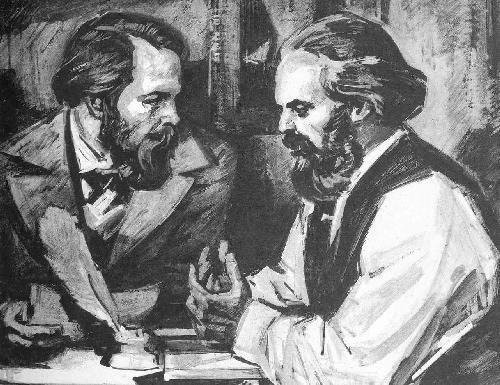 An artist’s depiction of Marx with Engels
An artist’s depiction of Marx with EngelsMarx wrote an entire tract critiquing the Gotha program. One of his primary objection was the manner in which “equal rights” was formulated. Marx pointed out that individuals were different. Some are superior to others “physically, or mentally”. He derided equal rights of the manifesto as a “bourgeois right”. Marx explicitly points out that people have unequal outcomes and needs. He writes “Thus, with an equal performance of labor, and hence an equal in the social consumption fund, one will in fact receive more than another, one will be richer than another, and so on. To avoid all these defects, right, instead of being equal, would have to be unequal.”
This is very different from today’s progressive conception of equality. Many progressives today actually do advocate for near absolute equality. This leads people to argue for ridiculous propositions. The former prison warden Tekla Miller, for instance, has argued about how men and women prisoners should be treated in the same manner. Thus, women’s prisons should have equal weapon allocations and women escapees should be shot by guards just as men escapees are shot. The Marxist political activists Angela Davis rightly points out that these “liberal” and “formalistic notions of equality” allows “male prisons to function as the punishment norm.” According to Davis, “a more productive form of feminism would question the organization of state punishment for men as well.”
Conservatives treat Marxism as a dogma. Every “socialist” is supposed to believe and advocate for a totalitarian communist state. This is not true. Yes, there are ultra leftists and naive social justice warriors(to use their phrase) who do advocate for violent communist revolution. But these are only a minority. Most left-leaning thinkers today advocate for worker co-ops,social policies like universal health care and democracy. A cursory glance at the works of Marxist economist Richard Wolff, libertarian socialist Noam Chomsky,David Harvey& Yanis Varoufakis would lead anyone to come to this conclusion. Disagreement with social democratic policies is obviously fine. It is an argument worth having. However, painting all socialists with the same brush actually harms the conservatives in their fight against progressive identitarians. In fact, Marx barely critiqued conservatives. Most of his criticism was directed at social democrats(today’s progressives),anarchists and variants of socialism that he disagreed with. As we’ve seen, there is a Marxist argument to be made against not only equality of outcome but also against postmodernism(Eagleton,1996).
If one treats Marxism as a dogma, then it becomes very easy to use Marx to criticize today’s neo-Marxists. Unfortunately, conservatives rarely do it, even though they label every socialist as “Marxist”. It is actually very easy to critique today’s progressives using Marx as a starting point. Marx believed that socialism cannot be achieved in depleted societies. For him, capitalism was a progressive and necessary force. Industrial societies, he argued, will reduce scarcity, thus creating the conditions needed to usher in communism. A “high degree of development” is “an absolutely necessary practical premise”. A society with “destitution”, “struggling for necessities” will result in “old filthy business”(same old story). In absence of these conditions, the so-called socialist society will turn into an autocracy. This is exactly what happened in Soviet Union. The Soviet Union went from being a feudal society to a socialist bureacracy. Thus, missing the essential condition of capitalism. In fact, Marx actually encouraged free trade as socialism can only arrive in a country where capitalism has reached its limits. Shouldn’t self-described Marxists in India, then, encourage free market and industrialization as India is still “struggling for necessities”?

I do not want to elaborate on merits of Marx’s critique of capitalism as it has been done too many times before. Interested readers can check out David Harvey’s Companion to Capital for a concise summary. I will, however, mention Bakunin’s critique of Marx’s transitional “dictatorship of proletariat”. This has been opposed by many other socialist thinkers but the anarchist Bakunin was the first to formulate a coherent criticism. He pointed out that dictatorship,by its very nature, is a form of enslavement. “all dictatorship has no objective other than self-perpetuation”, wrote Bakunin, “and that slavery is all it can generate and instill in the people who suffer it. Freedom can be created only by freedom” I urge you to read the whole critique as its very engaging as well as relevant.
Capitalism alienates workers from their own work. They are often forced to do jobs against their own will. They do not own the means of production, as a result of which they feel disconnected with their work. They become, in other words, just a cog in the machine. Their value is reduced to a thing. An object.
The epidemiologist Michael Mormot has conducted studies on mortality rates among British civil servants. He found that those who occupied the lowest hierarchy were more susceptible to Coronary Heart Disease. Health becomes better the higher you rise up the hierarchy. Mormot terms this as the “status syndrome”. Could this be due to relative poverty? No. Research has shown that PhD. students have better mortality rates than those with bachelors degree. A similar pattern can be found in the US, where blacks have 9 years shorter life expectancy than that of blacks in Cuba despite earning 4 times more. It’s not money which is leading this health epidemic. Its the position that one occupies in the hierarchy. Its about how one is treated in a society relative to others. Its about the degree of control that one has over their work. Mormot’s findings suggests that individuals who have a higher degree of control over their work, who are engaged willingly are less likely to become depressed than those earning the same salary,with the same status, working in the same office.
It isn’t just work from which individuals are alienated. Marx pointed four types of alienation. We are now more alienated than ever from others, from our peers and fellow members of our species. The psychologist Martha McClintock’s research has shown that social isolation in mice not only increases stress but also makes them more susceptible to spontaneous tumors. Susan Pinker has written about how isolated people have lower mortality rates. On a superficial level, it might seem like social media has made us more connected. This is far from true. In fact, those who use social media are more likely to be depressed.
A common criticism of Marx is that he didn’t believe in nature. This isn’t true. In fact, it was the enlightenment thinker Locke who didn’t believe in nature. The modern form of the blank slate derives from him. Marx, on the other hand, repeatedly refers to nature. In Capital-Vol-1, for instance, Marx refers to labour as a “process in which both man and nature participate”. He refers to man as a “natural living being”. However, Marx is not a determinist. He believes that man is a creative being and has the potential to transform the world around him. This is scientifically accurate. The society we have organized is in rebellion against our “selfish genes” as Dawkins points out. The likes of Peterson often resort to naturalistic fallacy veering on social darwinism(a discarded pseudoscientific idea). Marx, on the other hand, points to “human-essense” or “species-essence” in his last form of alienation. It is “imagination” which distinguishes humans from other animals. There is an intrinsic potential in humans to be free and to be creative. This is obstructed by external social forces. Humans are subjected to work for others. To acchieve their true individuality,they must free themselves from the demands of their conditioning.
The separation between consumers and the product leads to commodity fetishism.
What is commodity fetishism? In simple words, the idea that commodities are more important than human beings. The easiest way to explain it is through advertisements.
 Banksy
BanksyIn 1978, two psychologists conducted an experiment to assess the impact of advertisement on kids. One group was shown commercials of a toy while the other wasn’t. Both were given an option:- they can either choose to play with a terrible kid who has a toy or they can play with a kid who doesn’t have a toy but who’s nice. The group which were exposed to commercials choose to play with the nasty kid with a toy. They prioritized an object, a toy over a human being. They decided to choose this despite the fact that this made them unhappy
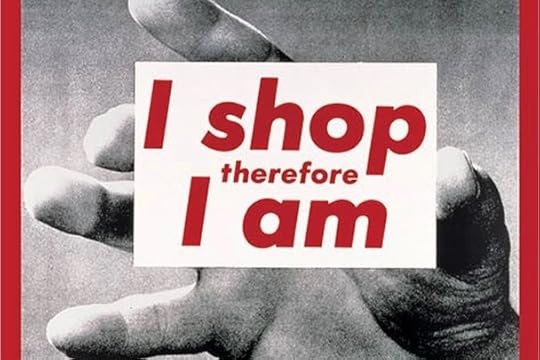 Détournement
DétournementCommodity fetishism ensures you keep wanting more. You’ll never see an advertisement which asks you to be satisfied,to be content with your life. They want you to have more. You have to be imperfect in order for them to sell things, whether its fairness creams or a new dress. These commodities become status symbols. You are looked upon as an ideal if you own the latest version iPhone. It is the commodity which takes primacy,not you. The commodity almost defines your identity. There is an illusion of individuality to it all. You think you choose the products you want to buy when you’re being obviously bombarded by messages from mass media. The commodity starts defining your happiness. The French Marxist Guy Debord later expanded this concept. He called it the society of the spectacle. A society where the commodities rule us. We become mere agents. Détournement is the method by which one uses conventional form of mainstream expressions i.e. movies,painting,meme,music etc. to deliver subversive messages. A good example of this would be the work of the anonymous grafitti artist Banksy.
My intention,through this article, wasn’t to give a general introduction of Marx. I wanted to show the complexity of thought underlying Marx. Yet, I have barely touched the surface. One can write pages and pages on Marx and it’d still not be enough. His ideas will continue to permeate sociology(he was one of the founders of the discipline),history,politics,philosophy and economics for a long time to come. As I have pointed out before, Marx has his shortcomings but so does every thinker. There is more than enough reason to take Marx seriously.

September 4, 2020
Destigmatizing Mental Health
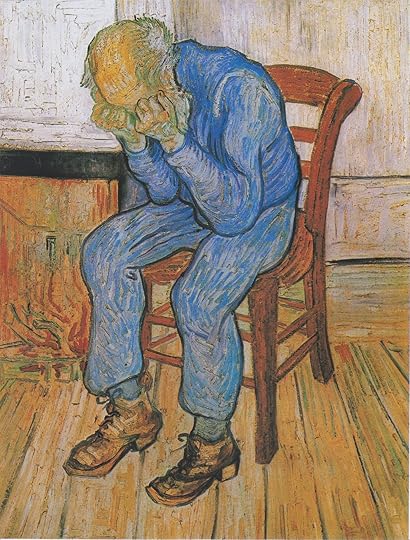 At Eternity’s Gate by Van Gogh
At Eternity’s Gate by Van GoghThere has never been a more apt time to talk about mental health. Nothing much has changed in our discourse on mental health since the last few decades. In India, mental health continues to remain a stigma. What shocks me today is that journalists,whom one would expect to know better, are positively contributing to the perpetuation of stereotypes. “Does he look depressed?” they ask on national news programs while flashing videos of an actor who allegedly committed suicide due to mental health problems. How does a depressed person look? This is not a hard question to answer. Here’s how a depressed person looks:-

The image is of Linkin Park’s lead singer Chester Bennington clicked just days before he committed suicide. He struggled with clinical depression his whole life. His wife shared a video of him 36 hours before his death, smiling and having fun with his family.
Chester wasn’t an outlier. The singer Chris Cornell too suffered with clinical depression. He committed suicide in 2017 just hours after performing his last show.
Society’s perception of mental health stems from a lack of awareness and understanding about what it actually is. There are many who are educated yet hell bent on denying the existence of mental health. Consider the instance of a Bollywood filmmaker who pondered whether depression,bipolar disorder and “Multiple Personality disorder”(no longer known by that name) are just “fancy words”. He further argued that “families are the best psychiatrists”. This line of thinking is obviously problematic. However, I don’t want to base my article on a low resolution strawman version of mental illness denial. We’ll see why this filmmaker is wrong but I’ll also attempt to steelman his sentiments.
Mental illness denial has a long intellectual history. Psychology as a field of scientific inquiry in its contemporary form was popularized by the likes of Sigmund Freud and Carl Jung. Even though they helped popularize the field,their theories are now largely discredited. The problem as such is not that psychology is a relatively new field. The problem is its implications. Evolutionary biology is relatively new as well. However, it doesn’t impact us at an individual level in the same manner. Psychology/psychiatry, on the other hand, deals with patients and attempts to cure them.
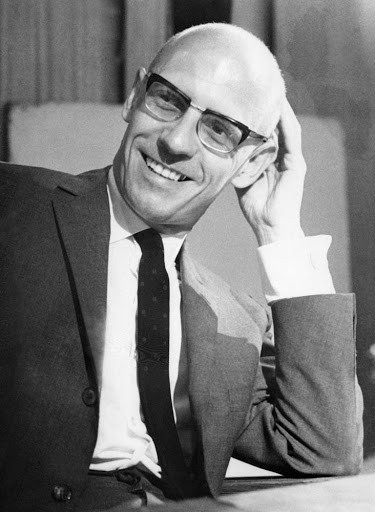 Foucault
FoucaultThe form of mental illness denial which is prevalent today was first articulated by the French philosopher Michel Foucault. His scepticism of mental illness as a concept emerged from a general distrust of institutions. In Madness and Civilization, Foucault carves a history of mental illness. There is no doubt that his thesis on history of mental illness(that madness has been used by institutions to abuse individuals) is correct. However, his argument is more complex than this. According to Foucault, mental illness exists “only within a culture that recognizes it as such.” He argues that psychology’s failure to formulate a unified theory of personality makes it markedly different from physiology. “Mental pathology” is abstract while “organic pathology” has achieved a form of “psychosomatic totatility”. The lack of a totalizing objective description of human nature leads Foucault to conclude that science of the self is futile.
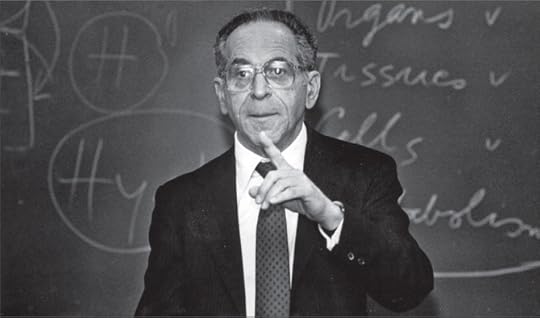 Thomas Szasz
Thomas SzaszAlmost a decade after Foucault’s attack on psychology, Thomas Szasz published his seminal work “The Myth of Mental Illness”. Almost immediately after its publication, it garnered widespread attention. Unlike Foucault, Szasz was trained as a psychiatrist and remained a professor of psychiatry for most of his life. His critique of psychiatry/psychology was motivated by his libertarian beliefs. Mental illness refers to “problems in living”. It is merely a metaphor, if Szasz is to be believed. As such, it is no different than “belief in witches”. The absence of biological attributes meant that mental illness was not a disease in the sense that cancer is a disease. The mind is non-existent,unlike the brain. Psychiatrists, according to him, were religious-polititical leaders. The psychiatrist-patient relationship was one where the former had the upper hand and used her/his power to manipulate the latter. A major difference between Szasz’s and Foucault’s critique is Szasz’s belief that individuals control their behavior. Foucault believed that mental illness was merely the product of a disoriented society. The popularity of Szasz’s critique was partly the result of the prevalence of involuntary admission into mental asylums and lobotomy. These practices has experienced a significant decline since then. Szasz was also one of the earliest proponents of gay rights. His denunciation of mental illness extended to the DSM’s classification of homosexuality as a disease. It was only in 1973 when this was formally removed from the DSM.
Szasz and Foucault were writing at a time when the bulk of psychology was actually unscientific. Apart from barbaric practices, Freudian speculations were accepted as the truth. This was succeeded by a general acceptance of Skinner’s Behaviorism. We know now that both of these school of thoughts were severely flawed. This is not to say that they were never correct. Indeed they had their moments. But the small victories of Skinner and Watson were taken as evidence of the accuracy of behaviorism in general. While the critics were right to point out the excesses of these school of thoughts, they were wrong to denounce the field of psychology/psychiatry itself as nothing more than pseudoscience.
Does mental illness have any biological markers? Is it purely socially constructed as its critics claim?
Let’s try to understand this by first looking at one of the most common mental disorders- Depression. People often confuse depression with sadness. For them, the answer to the “why” question must be external or societal. They’re baffled when seemingly successful people or celebrities are diagnosed with clinical depression. What could possibly have gone wrong in their lives? This is perhaps the most common misconception about depression. Depression is not “sadness”. Sadness has an external reason and can be resolved. Consider this scenario:-
“Richard nervously looked at his grades. They were terrible. He was on the verge of tears. As Richard checked again, he realized that this wasn’t his report card at all. His teacher had made misplaced his report card with a fellow classmate.”
Richard felt sad when he saw the report card. This feeling suddenly transformed into relief as he found out that the report card wasn’t his own. The solution here was external. Good grades would make Richard happy. Its not that simple for those diagnosed with depression. They often do not have an external reason. They could be extremely successfully yet feel suicidal. A diagnosis of depression is made when an individual shows symptoms for at least 2 weeks. What are these symptoms? Self injury, grief, guilt, Anhedonia ,psychomotor retardation, loss of apetite, insomnia etc.
Anhedonia is the loss of interest/pleasure in things/activities that one usually enjoys. For a musician, it is the loss of interest in music. For a writer, it is the loss of interest in writing. For a foodie, it is the loss of interest in food. This is essentially what depression is. A general loss of pleasure. The “inability to appreciate sunsets” in Robert Sapolsky’s words. It also has a strong biological marker. The dopaminergic pathways activate tegmental neurons, which in turn leads to the release of dopamine. Stress reduces the stimulation of dopamine neurons, leading to anhedonia.
 Ophelia by John Millais
Ophelia by John MillaisThere are many environmental factors influencing depression:- loss of a parent in childhood, family problems etc. Nevertheless, the susceptibility of an individual to succumb to these environmental triggers often depend on biological markers. For instance, the excess of prenatal glucocorticoids(a stress hormone) makes the adult individual more susceptible to environmental triggers.
When all forms of therapy i.e. behavioral therapy, medications etc. are tried on an individual with major depression without any trace of success, clinicians resort to a surgical procedure. This is known as cingulotomy, where the anterior cingulate, responsible for regulations of abstract emotions, is removed.
Depression isn’t the only mental disorder with genetic components. Schizophrenia also has strong biological markers. Recent research on dyslexia suggests the prevalence of cortical abnormalities among dyslexics. Panicogens (sodium lactate, caffeine) play a major role in triggering panic disorders. Szasz’s claim of an absence of observable pathology is not just wrong but also a terrible standard by which to define illness. We can’t observe migraine visually the way we can observe a tumor. Fortunately, no one denies the existence of migraine due to this. Moreoever, neuroimaging now makes it possible for us to observe what happens inside the brain of individuals with mental illness(unsurprisingly, they’re different from normal brains).
What does this entail? Isn’t it only going to make us treat individuals suffering from all forms of mental illness as “mad”? Wouldn’t it only ostracize them more? Not necessarily. People do not empathize with individuals who are depressed because they think it’s their fault. They treat depression as individual failure. They attribute it to mere pessimistic outlook. This allows them to make absurd statements like “dont be depressed” or “You won’t be depressed if you stop thinking negatively”. What they fail to understand is that depression isn’t in anyone’s control. Imagine saying “dont be diabetic” to someone who has diabetes.
Accepting mental illness as a serious biological dysfunction(which it is, as we have seen) leads us to emphatize with others better. It leads us to recognize that our thoughts aren’t in our control. It leads us to understand that depression can happen to anyone, rich and poor, successful and unsuccessful, young and old etc. Yes, we are going through a mental health epidemic. But we are also going through a mental health denial epidemic. People rightly feel scared of opening up about their feelings. Seeking psychological treatment continues to be a stigma. Individuals suffering from mental illness need more than just emotional support. They need psychiatric intervention. Mental illness denial corrodes the lives and happiness of individuals in a way in which we can only imagine. We will never know how many lives were irreparably damaged because they weren’t able to get emotional support and psychiatric intervention. The evidence is clear. It is the lack of awareness which is the problem. We need to aim for a compassionate and understanding society where its okay to be not okay.

August 23, 2020
The Ecstacy of Ideology: Islam,terrorism and grand narratives

In 1998, the Arabic newspaper Al-Quds-Al-Arabi published a document declaring “Jihad against Jews and Crusader”. The “fatwa” briefly listed out grievances against the United states, condemning US for “occupying the lands of Islam in the holiest of places, the Arabian Peninsula, plundering its riches, dictating to its rulers, humiliating its people, terrorizing its neighbors, and turning its bases in the Peninsula into a spearhead through which to fight the neighboring Muslim peoples.”
These crimes were enough to declare the killings of all Americans, “civilian and military”, as the duty of every Muslim. The document bore the signature of Osama Bin Laden,along with heads of Jihadist groups in Pakistan,Bangladesh and Egypt.
Three years after the fatwa was published, the 9/11 attacks shook the world. It seemed that the “clash of civilizations” predicted by Samuel Huntington was finally here.
In the immediate aftermath of the attack, the then US President George W. Bush proclaimed that this was a war of “good versus evil”. Senator John McCain further re-inforced this point when he said “this is the face of transcendent evil”. The philosopher Sam Harris was more blunt. We were not at war with terrorism, he wrote, we were at war with Islam.
Are we? Does Islam pose a unique challange to the world? Is Islam irredemable? Or is it, as liberals keep reminding us, “a religion of peace”?
Religions cannot be divorced from the socio-political context in which they originate. They are a product of their times. For instance, monotheism, as we know it today, was born out of political complications. The earliest form of monotheism was propagated by the Egyptian king Akhenaten. However, this lasted for a very brief period.
Initially, there was no separation between the church and the state. The political and the religious were one. Battles were not fought merely between nations/empires. They were fought between Gods. Divine beings were directly involved in war. In the Old Testament, Yahweh directly strategizes the war(2 Samuel 5:19–23). The defeat of a tribe meant the defeat of the God venerated by that tribe. Usually when a tribe lost, it adopted the God of the winning tribe. This is not to say that they stopped believing in their previous God. The tribes accepted the existence of different dieties. They merely worshipped the stronger deity. This form of belief is known as monolatry. Contrary to what Biblical fundamentalists believe, the Old testament asserts the existence of monolatrism. Consider this verse:-
“When Elyon gave the nations their inheritance, when He divided the sons of man, He set the boundaries of the peoples according to the number of the sons of God. But the Yahweh’s portion is His people.”( Deuteronomy 32:8)
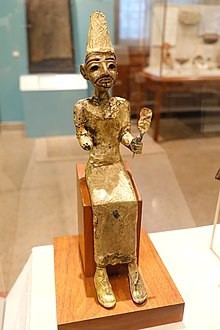 Elohim
ElohimElyon or El or Elohim/El Shaddai(usually translated as God or Most High)is the deity that the likes of Issac and Abraham worshipped. Yahweh(usually translated as Lord) is the deity which appeared to Moses much later. When the Israelites were defeated by the Babylonians in 586 BCE, they refused to stop worshipping Yahweh. The existence of their nation was predicated on the superiority of their God. They came to terms with their defeat by proclaiming the existence of only one God i.e. Yahweh. They still had to reconcile the existence of Elohim(God of Abraham,Issac and Jacob) with their worship of Yahweh. Thus, Yahweh tells to Moses “I am Yahweh. I appeared to Abraham,Issac and Jacob as El Shaddai, but by my name Yahweh I did not make myself known to them”(Exodus 6:2–3) Problem Solved!
This is but one of the examples of how contempary political situation influences the formulation of theological precepts.
The difference between religions often emerges due to the political context around which they’re formed. Islam was formed by a conquered people, unlike Christianity. Its founder, unlike Jesus,Moses and Buddha, ruled over a state. There is a precedent of separation of church and state(Matthew 22:21) in Christianity. Islam, on the other hand, considers the bond between the sacred and the profane to be adamantine.
The historian of Islam Bernard Lewis points out that Islamic society has always been a polity as well as a religious community. Lewis further points out that for many Muslims, their loyalty to religion transcends other loyalties. It is for this reason that we have an Organization of Islamic Conference but no such organization for Buddhist or protestant nations.
The military form of defensive Jihad finds explicit support in the Quran as well as Hadith. Consider this verse, for instance:-
“Those of the believers who stay at home, other than the disabled, are not equal to those who strive in the path of God with their goods and their persons. God has placed those who struggle with their goods and their persons on a higher level than those who stay at home” (Quran 4:94)
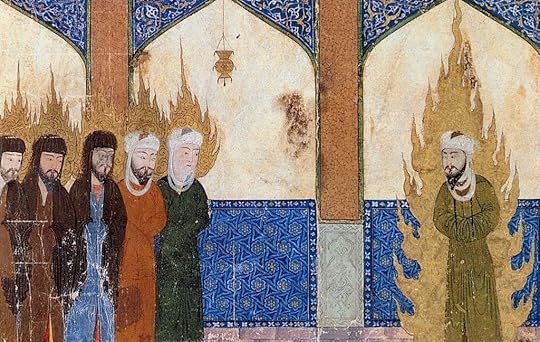 Muhammad leads prayer, Medieval Persia
Muhammad leads prayer, Medieval PersiaMuhammad’s death splintered the Islamic community. Within 29 years of the Prophet’s death, three caliphs were assassinated. Two of them were assassinated by Muslims who believed they were justly removing tyrants. Later, the Ḥashishiyya(Assassins) sect was formed with the intention of eliminating those who were impious. They primarily targeted Muslim rulers, though they did murder some Christians as well. They were also known as the fidayeen (those who sacrifice themselves). Scholars have argued that they are the closest precursor to contemporary terrorists/suicide bombers.
In the 18th century,Muhammad Ibn Abd al-Wahhab formulated the doctrine of Wahhabism. He advocated for a purer version of Islam,relying only on the Quran and Sunna. He considered the reverence towards the graves of prophet Muhammad and his companions to be unislamic. These were innovations(bid’ah) which needed to be shunned. According to him, every pure Muslim had an obligation to wage Jihad against Muslims and non Muslims alike. Since Muslims had abandoned the teachings of the Prophet by committing sins such as veneration of graves, they were now no different than Mushrikin(polytheists).
Inspired from wahabbism, the Islamic theorist Sayyid Qutb argued that contemporary Islamic society is no different from Jahilliya(the age of ignorance before the Prophet preached Islam). Even “Islamic culture, Islamic sources, Islamic philosophy and Islamic thought are constructs of Jahiliyyahh.”To return to the ways of the First Muslims, it was necessary to eliminate the “lordship of Man”. The idea of Jihad being just a defensive war was fundamentally wrong. It was a product of the “defeated mind”, claimed Qutb. How did he reconcile these beliefs with clear injunction of Quran to fight only in defense? The Quran forbids the believers to transgress(2:190). The permission to fight is granted only for those who have been wronged,persecuted and oppressed(22:39). These contradiction are often reconciled by claiming that these were earlier verses, thus they held less value than newer verses(such as 9:29) which asked believers to fight those “who do not believe in Allah or the last judgement”.
The tradition of abrogating certain verses(Naskh) originates from the Quran itself. The Quran states “For whatever verse We might abrogate or consign to oblivion, We bring a better one or the like of it. Are you not aware that Allah is All-Powerful?”(2:106)
Drawing upon this tradition, the Jihadists claim that all of the peaceful verses were abrogated.
However, nowhere in the Quran is the killing of civilian women or children is prescribed. Osama Bin Laden made this clear when he said “the one issue on which all people agree, even if they themselves have been the victims of oppression and hostility, is that you cannot kill innocent children”. Yet, Bin Laden’s so called “fundamentalist” terrorist organization actively engages in the unislamic massacare of innocent Children as well as Muslims.
Critics of Islam argue that we are faced with an ideological battle. The only way to come out of this battle is to destroy the motivating ideology i.e. Islam itself. This kind of attitude is exemplied by the likes of Ayaan Hirsi Ali. Islam, she claims, is beyond reform. The problem isn’t a few rotten apples, the problem is the “entire basket”. Quoting Sam Harris, she re-iterates that Islam is a moderlode of bad ideas. Islam needs a reform.
I consider this strand of thinking to be unpragmatic for the most part. What they fail to understand is that even those who claim to be “fundamentalist” dont actually adhere to everything that the Quran or the Hadiths prescribe. They don’t hesitate to resort to clear unislamic means to achieve the end, as we have seen. Moreover, the argument that Islam has not undergone reformation like Christianity is not entirely correct.
Consider the example of the fatwa issued against Salman Rushdie by Ayatollah Khomeini. The fatwa called upon Muslims around the world to assassinate Rushdie and those involved in the publication of the book. Rushdie’s “crime” can be seen as tantamount to apostasy. Lewis has argued that the fatwa was in direct contradiction to Islamic jurispendence. Fatwa is a ruling. Apostasy is punishable by death according to many Hadiths. Both sunni and Shia schools of Islamic jursipendence consider apostasy to be a crime. However, they differ on the punishment. Some schools prescribe a waiting period for recantation failing which they are to be executed. The Ja’fari and Hanafi school only prescribe solitary confinement and flogging for women until they recant. Moreover, these punishments are applicable in Islamic states. The idea of prescribing punishment to a Muslim in a distant part of the world is of relatively recent development.
Suicide bombing, too, is a relatively recent development which finds no support in the Quran. Dying in the hands of the enemy is encouraged but killing yourself in the process is unislamic. In fact, suicide is actively discouraged both by the Quran and the Hadiths. The Jihadists are attempting to “reform” Islam, whether we admit it or not. They are making fundamental changes in the way Islam has been percieved for centuries. Islam is already going through a reform. The problem is the path that this reform is taking. The need of the hour is to change the path of this reform and advocate for changes that are conducive to the ideals of democracy, secularism and pluralism.
It is also not correct to claim that Islam is a religion of peace. As we have seen, there is enough in Islam that can be used to justify violence. Islam is a religion and like every religion it has its faults. Every religious person picks the parts he/she likes and rejects the one which doesn’t fit her/his narrative. One can’t accept everything in a religion for the simple reason that there are contradictions in every religion. It is neither purely a religion of peace nor a religion of violence

Islamic society is often accused of being frozen in the middle ages. Yet, the tradition of openness and rationality actually flourished under Islam in the middle ages. Muslim philosophers such as Al Kindi drew influence from Greek treatises and helped to translate them into Arabic. The likes of Al Khwarizmi widely influenced the establishment of Algebra as a separate discipline. The rationalist school of thought called Mu’tazila gained traction. It sought to bridge the gap between faith and reason. At the same time, philosophers like Al-Ash’ari advocated for a closed view of Islam. It was the Mu’tazila school which was accepted as the standard doctrine. The seventh Abbasid caliph actively persecuted Muslims who did not subscribe to the rationalist doctrine.
Starting from Alfonso I’s conquest of Zaragosa, Islamic civilization began to decline. Hulagu’s conquest of Baghdad served as the final nail in the coffin. The Mongols destroyed mosques,hospitals,shops,houses and most notable the grand library of Baghdad. This library housed the works of Al Kindi, Averroes, Al Ghazali, Omar Khayyam and other Islamic scholars. Islamic society retreated to orthodoxy in the aftermath. It was during this time that puritanical and extremist forms of interpretation such as those of Ibn Tammiyah and Abd Al-Wahhab gained popularity.
Islamic society since then has not been able to recover the “Golden Age”. The transnational revivalist Jihadist groups like Al Qaeda argue for a return to the glorious past of the first Muslims. Al Qaeda initially fought in Afghanistan to ward off the Soviet invaders. The radical terrorist groups flourished in the most backward countries, ravaged by war and deprived of resources.
Bin Laden requested the leader of the Taliban(Afghanistan) Mullah Omar to shelter Al Qaeda. Omar agreed. Not long after Taliban sheltered him, the Al Qaeda started terrorist attacks. The Taliban was an organization which had no pan-Islamic ambitions. It was merely fighting for Afghanistan. The terrorist attacks irked Mullah Omar. He announced that Bin Laden has “no authority to issue fatwa”. Why did the Taliban continue to shelter him? The anthropologist Thomas Barfield describes it in this manner:-
“[The Taliban did not] anticipate the potential difficulties that might arise by giving sanctuary to Osama bin Laden and his al Qaeda movement in the late 1990s. After September 11th 2001, when the United States threatened them with destruction if Osama and al Qaeda were not expelled, Omar called for an assembly of clerics to meet and affirm his claim that because Osama was a guest of the country he could not be given up. With a nuanced approach that would have done credit to any Pashtun tribal jirga, the assembled clerics told Omar that he must indeed protect his guest, but that because a guest should not cause his host problems Osama should be asked to leave Afghanistan voluntarily as soon as possible. It is notable that the question Omar tabled was not one of sharia jurisprudence, but rather an issue of Pashtunwali . Thus, and very fittingly, the last major policy decision of the Taliban before they were driven from Afghanistan was based on good customary law standards in which religious law provided only the window dressing”
The sacred tenets of Pashtunwali tribal code notably include hospitality towards vistors(Melmastia) and giving sanctuary to a guest, even at the cost of your own life(Nanawatai). The taliban did not surrender Bin Laden because of these codes, not because they had the same goal. Here is how Mullah Omar explains it:-
Islam says that when a Muslim asks for shelter, give the shelter and never hand him over to enemy. And our Afghan tradition says that, even if your enemy asks for shelter, forgive him and give him shelter. Osama has helped the jihad in Afghanistan, he was with us in bad days and I am not going to give him to anyone.
He was not giving shelter to Osama because they shared the same religion. He was giving shelter to Osama because he had accepted him as a guest. He did “not want to go down in history as someone who betrayed his guest”.
The attempt to portray all Islamist groups as a monolith is wrong. These groups have different goals and therefore need to be tackled differently. The Taliban has no interest in expanding to other countries. Its merely concerned with its own country while the Al Qaeda wants to establish a global caliphate. Both are fighting a doomed war. However, the Jihadists capture the imagination of the public because they use terror as a tactic. More people die from air pollution and diabetes every year than terrorists. Yet, terrorism is percieved as a greater threat. Don’t get me wrong, we definitely need to tackle terrorist groups. But exagerration of the problem is exactly what they want. They want us to accept that this is a battle between good and evil, between Islam and the infidels, between two civilizations. By framing our rhetoric in this manner, we’re merely accepting their grand narrative. This merely helps them spread propaganda.
 Edmund Burke
Edmund BurkeGrand narratives are extremely important. They help to unite a society. One shouldn’t confuse grand narratives with history. They are merely stories that we as a society collectively tell ourselves. These stories don’t have to be true. They are, to use Edmund Burke’s terminology, a “mixed system of opinion and sentiment”. Burke talked about the value of “pleasing illusions” which “incorporated into politics the sentiments which beautify and soften private society”. These illusions, he argued, were “dissolved by reason”. Religions and ideologies are grand narratives. Group identities are often “fictions” which solidify and become real in the political and socio-economic sphere due to looping effect.
These narratives have severe limitations. They act as hindrance and often prevent us from seeing nuance. In the case of Islamic terrorism, they prevent us from recognizing the fact that the violent conflicts that we witness today are the result of scarce resources. As Scott Atran writes “When resources become scarce and competition intensifies,tribe relationships may contract and patrilineages begin to tear apart at their branching points”. Islamism results from a sense of being defeated and humiliated. This feeling of being “wronged” is one of the crucial motivating factors which drives an individual to terrorism. This is not to say that ideology has no role to play. Ideology serves as a means to an end. Its a catalyst, a symptom but not the source of the problem.
Let me elaborate:- 80% of Palestinians support suicide bombing. They agree that Islam permits suicide bombing. However, only 4% believe that Muslims have a duty to kill non Muslims. Its not religious piety which leads Muslim to support suicide bombing. In fact, in countries like Pakistan and Indonesia, the majority of Muslims do not support it. Palestinians believe suicide bombing is sanctioned to kill people because of what they “have done” and not “because of their contrary religious beliefs”.
It is this “percieved sense of injustice” which currently afflicts most of the Muslim world. Ironically, it is the same sense of injustice which forms the bulwark of the Hindutva grand narrative. No, I’m not claiming both are the same. I’m simply pointing out the similarities between their grand narratives.
Leftists in India rightly point out that there multiple factors which lead to Islamic terrorism. However, they fail to do the same multivariate analysis when it comes to Hindutva “extremism”. They do not critique the Hindutva right. They critique the grand narrative of the right. They sell you a better story, not a better solution. The narrative goes something like this:- The BJP is a fascist right wing extremist party which is hell-bent on turning India into a “lynchistan” and “Hindu Rashtra”.
This narrative ignores the fact that India has always been an intolerant nation. Intolerance and mob lynchings didn’t start with the election of BJP. Only the opposition to it was amplified. Mob lynchings are not the the result of extremism of the right. They are merely the symptom of violence prevalent in every transitioning society. The solution, if this narrative is to be taken seriously, is the election of a party which rejects the Hindutva grand narrative. However, mob lynchings are actually committed by people of all communities. The problem here is the breakdown of law and order. The solution to this is:- rapid industrialization, police and law&order reforms.
Let’s understand this by taking the example of the United States. Lynching in US was rampant in mid to late 19th century. The victims belonged to both white and black races intitially though it became a racial issue in late 19th century. It experienced a spike in 1880s and started to decline in 1920s. Why? The Industrial Revolution! In America, the second industrial revolution/the Gilded Age started around 1870s and lasted till 1920s. It was around the same time that the demand for institutional changes, including women’s suffrage and political reforms became widespread. This was known as the Progressive Era(1890–1920).
Mob violence and intolerance are actually two separate problems. Industrialization doesn’t completely eliminate intolerance but it leads to a decline in violence. Mob violence cannot be solved by a change in government unless we start demanding systematic changes. The problem that we face now is one of resource scarcity and backward economic development. Unless these issues are resolved, otherization and mob violence will continue. I am not minimizing the danger of religious extremism. I recognize it as a problem. I also recognize the value of grand narratives and the need to feel a sense of pride. VS Naipaul correctly diagnosed Indian society as a “wounded civilization”. However, religious extremism is not the problem, it is a symptom. The grand narratives here serve as a distraction. Political groups use it only because it helps them win elections. The leftists have got their priorities wrong.

July 17, 2020
Uyghur Muslims,Islamophobia and the hypocrisy of liberals

I am writing this in the backdrop of a hunger strike started by the Islamic reformer Maajid Nawaz. Nawaz, a former Islamist, feels let down by his liberal counterparts for their reluctance to officially recognize the genocide of Uyghur Muslims unleashed by the authoritarian Chinese regime. What strikes me as odd is the fact that its the conservatives who are speaking out against the inhumane treatment of Uyghur Muslims by the Chinese authorities. Before grappling with this question, I’d like to summarize what’s happening in China.
Genesis of a genocideThe Uyghurs in Xinjiang have a history of resisting the Communist rule. The region currently known as Xinjiang was formerly East Turkestan or Uyghuristan. In 1949, a plane carrying East Turkestan leaders who were flying to negotiate with China crashed, killing all its occupants. This led to the disintegration of the nationalist movement and made it easier for the Communists to occupy the region.
The population of the ethnic Chinese population saw a 35 percent increase in a span of 27 years due to the policy of large scale migration. The liberalization of China in 1980s created a relatively tolerant environment for the Uyghurs. This didn’t last long. Opposition groups in China are technically illegal. However, the secret threat to the Communist regime primarily comes from groups centered in the Xinjiang province.

The separatist movement in Uyghur became evident in the 1990s. The execution of 30 independence Uyghur freedom fighters led to a massive uprising in the city of Ghulja in 1997. Protesters marched around the city, shouting slogans against the Chinese regime. The Chinese suppressed the movement mercilessly through use of violence, water cannon and tear gas. Around 100 were said to have killed in Chinese Gunfire(the official figure is much lower).
In the aftermath, thousands of Uyghurs were arrested. The process of otherization started. They were labelled as terrorists. Their freedoms were restricted. The Communist regime persecuted everyone who dared to speak against them. Criticism/propagation of “separatist ideas” through books, stories, news media, periodicals and cultural activities were explicitly prohibited. Article 105 of Criminal Law of the People’s Republic of China prescribes life imprisonment for “slander/spreading rumor” against the socialist regime.
Uyghur writers and scholars critical of the Chinese regime are being persecuted. The writer Nurmemet Yasin was jailed in 2005 for writing a story titled “The Blue Pigeon”. The Chinese authorities claimed the story incited separatism. Yasin died 5 years later in prison.

Uyghur Muslims are forbidden from giving names which have explicit religious connotations to their children. Minors are forbidden from participating in religious activities.Around one sixth of mosques have been completely demolished. In an effort to “erode the ethnic group identity” of Uyghurs, graveyards are being destroyed. Around a million Uyghurs are detained in Chinese “re-education camps”(concentration camps,for all practical purposes). Individuals are held in these camps arbitrarily. According to leaked Chinese cables, the majority of individuals were held for being “untrustworthy”. Many individuals were held simply for the crime of growing a beard, wearing a veil and visiting a foreign website.
Horrific stories of what happens inside these camps have since come out from victims who have escaped. The victims are tortured, have to face beatings, brainwashing, are being forced to use the toilet front of security cameras, forcibly sterilized, given electric shocks,sexually abused and subjected to forced hard labor.
Leaked official documents reveal that the Chinese detain these individuals because their “thinking has been infected by unhealthy thoughts”. In 2018, the communist party member Wang Yongzhi was removed because of his reluctance to round up individuals arbitrarily. In 2017 alone, 12000 party members were investigated for alleged “infraction”.
Islamophobia and the hypocrisy of liberalsLeftists claim to stand up against Islamophobia. They claim that Narendra Modi’s regime has fostered a climate of Islamophobia and unleashed state sponsored violence. They rightfully outrage when a random bigot cancels his Zomato order simply because the delivery person belongs to a different religion. Yet, they remain silent on the state sponsored genocide and persecution of the Uyghurs.
Their deafening silence perplexes me. The reason behind their silence is their affinity towards authoritarian China. The general secretary of the Communist Party of India(Marxist) Sitaram Yechury claims that Indian communists have an affinity towards communists worldwide. He claims reports of Human Rights violation of the Uyghurs are “rubbish”, instead choosing to believe in the official narrative of the Chinese regime. Ironically, these same leftists claim that the Indian government is lying when it comes to Kashmir. They have more faith in the totalitarian communist regime of China than the democratically elected government in India.
These Renegades of social justice also claim that Hinduphobia is a “manufactured conceit”. There’s absolutely no doubt in my mind that Hinduphobia i.e. irrational hatred of Hindus as a group exists. This hatred is reflected in the brainwashing of a generation of Pakistanis through public school textbooks. Hindus are accused of betraying Muslims. They are represented in an extremely antagonistic manner. Pakistan’s leading English language newspaper “Dawn” has admitted that public school textbooks promote a bigoted view of history and propagate ideas about the inferiority of non Muslims. Hinduphobia isn’t confined to one nation. It also exists in democratic nations such as UK&US. This often escalates to physical violence. For instance, in 2019 a Swaminarayan temple was vandalized. Its walls were sprayed with “Jesus is the only God”. There are numerous examples of hate crime against Hindus.
Irrational hatred of all groups exist. Racism against whites exists. Black nationalist groups such as Nation of Islam believe in the superiority of black race over whites. They essentially want to create an ethno-state, one where blacks rule. According to Elijah Muhammad, the black man is the rightful owner of the earth. Hatred against whites has often led many Black individuals to shoot innocents. A notable case is that of Gavin Long. In 2016, Long killed 3 policemen in Louisiana during a shootout before being taken down by the cops. In one of his YouTube videos, he referenced the murder of 5 policemen in Dallas only 12 days earlier by a black nationalist. It was “justice”, according to him. Long claimed that “the abundance of Melanin in Black humans produces a superior organism both mentally and physically.”
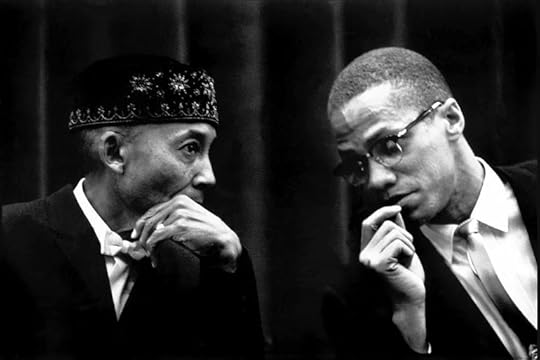 Leader of Nation of Islam Elijah Muhammad with Malcolm X
Leader of Nation of Islam Elijah Muhammad with Malcolm XA misplaced sense of superiority and persecution, regardless of race/political ideology, is what leads individuals to commit violence. This is not to say that their grievances are not valid. Extremist groups often use valid grievances to rope in members. Even the dreaded terrorist Osama Bin Laden was concerned about climate change! Legitimate grievances makes it easier to indoctrinate individuals.
The “tyranny of the discontinuous mind” sees everything in binaries. Thus, it conflates criticism of religion with criticism of the people. This is why individuals criticizing Islam or Hinduism for legitimate reasons are often labelled “Islamophobe” or “Hinduphobe”. The reasonable ones among us must understand that there is a clear distinction between the religion and the people who believe in it. The ideologically possessed mind reeks of hypocrisy. It chooses to believe in certain agitprop while rejecting others. It suffers from the same malady its opponent suffers from. It doesn’t stand for principles, despite its repeated accentuation on it. It only stands for its group. It is this blind love which forces many communists to turn away from systemic injustice/genocide simply because it is “their side” which perpetuates it. The left must recognize that issues of genocide are beyond partisan politics. We must stand against injustice in principle. No conditions applied.




